Study Abroad in Chile


What to Expect in Chile
Study abroad in Chile and immerse yourself in the creative energy of a country emerging as an economic power with modern social programs and ties to both Europe and Asia.
You might practice Spanish at a market, meet up with local and international friends, and spend time with your host family all in an average day while studying abroad in Chile. Mix that with personal travel—imagine visiting Torres del Paine National Park or Peru!—and you’re ready for the Latin American adventure of a lifetime.
A strong and growing economy, a leader in continental rankings, and an incredible place to study abroad, Chile is calling your name.
On one of our Chile study abroad programs, you’ll learn not only in class or at your internship, but also when course-related trips and fields trips provide context to what you’re learning in the classroom, and allow you to explore Chilean life outside of your host city.

Emerging Economies: Buenos Aires & Santiago

Buenos Aires, ArgentinaSantiago, Chile
Designed for students interested in business, sociology, economics, sociology, and political science, this multi-location interdisciplinary program offers a unique comparative perspective of two of the strongest emerging economies in South America: Buenos Aires, Argentina and Santiago...
Spring 2025
Language of instruction:, language prerequisites:, visa required:.

Health Studies

Santiago, Chile
With a population of more than 5 million people, Santiago is both the capital of Chile and its largest city. Its residents have a community-centered public health system, one that you’ll be able to observe and experience first-hand when you study abroad in Santiago.
Part-Time Internship (Optional):
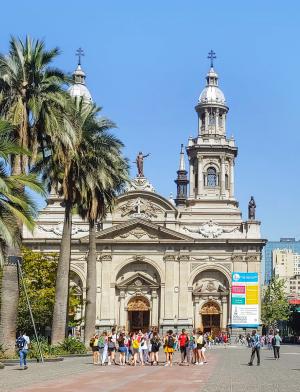
Politics, Social Justice & Language
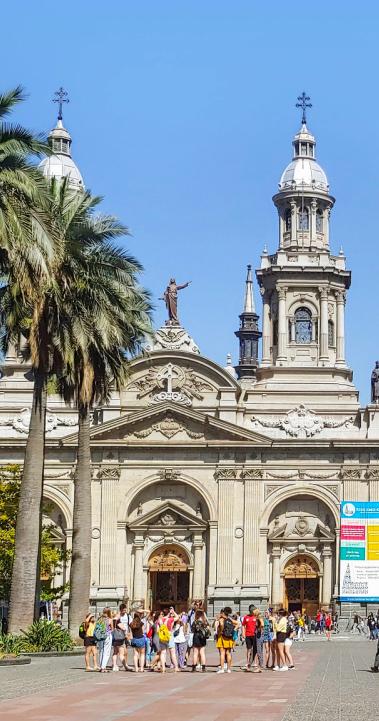
Our Politics, Social Justice & Language Program allows you to fully immerse yourself in the daily life and culture of Chile while studying the Spanish language and political topics.

January Term - Health Studies

Ideal for students considering careers in health-related fields, this program offers you the opportunity to learn about health care policy and delivery systems in the context of Chile’s community-centered public and private health care system.
January Term 2025

Summer - Health Studies
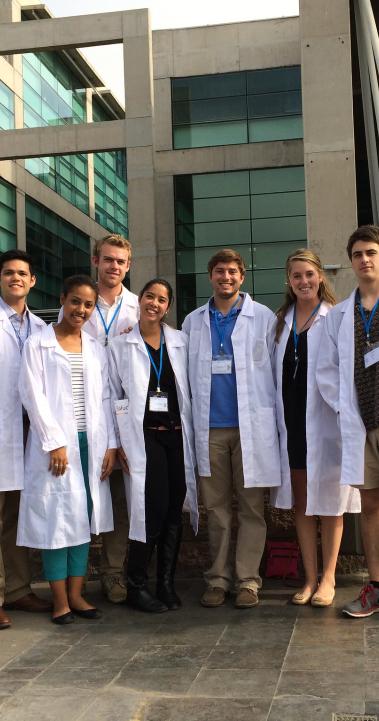
Study in Santiago and gain public health-related experience and an appreciation for culturally based health care practices within Chile’s community-centered public health care system.

Summer - Internship

Spend your summer internship in Chile with a full-time IES Internship—Intern in Santiago in fields like business, international relations, not-for-profit & more!
About the IES Abroad Center
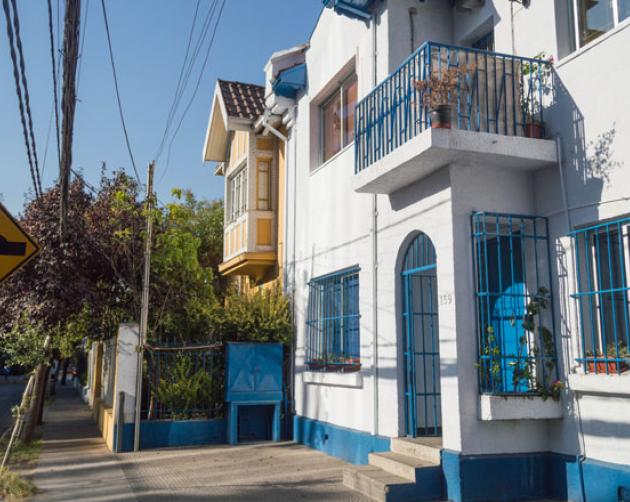
The Center is where our highly trained local staff provide on-the-ground support throughout your time abroad.
The IES Abroad Santiago Center is located in Providencia, a vibrant residential neighborhood in central Santiago. Whether you’re in between classes, studying in the open-air courtyard, or eating in the shared kitchen and dining area, the Center is your study abroad hub.
Health & Safety
With 70 years of experience, we are proud to set the standard for health and safety in study abroad. Our Chicago-based and on-site staff are all highly trained and experienced in the matters of health, safety, and crisis management. We are here for you from predeparture to your return, and are ready to support you—no matter which time zone you’re in. We plan for "what ifs" so that you don’t have to. From international health insurance included in the cost of your program to highly-trained local staff who can connect you to English-speaking healthcare providers, we are working around the clock to ensure your health and safety while abroad.
Support You Can Expect to Receive on Our Programs
In the case you need to see a doctor or mental health professional.
Whether you encounter an issue while traveling or in your host city.
Receive any emergency updates from IES Abroad staff via call or text.
Health and safety information presented at orientation by on-site staff.
Allowing you to share independent travel plans.
So that you feel prepared to respond to an emergency should one arise.
Helpful Links
Apply for your passport today.
Getting your passport is a crucial step for studying abroad. With processing times taking longer than usual, consider this a gentle reminder to not procrastinate on getting or renewing your passport.

The Student Experience

A Pitch for Traveling Within Your Country
In deciding where you'll go on weekends, consider traveling in your country. My favorite memories have been in Spain, like the photo from Granada.
Halfway(ish) Point: Resting, Reflecting, and Looking Forward
It’s hard to believe I’m over halfway through my semester abroad! Here are some reflections and thoughts about what the rest of the semester holds.

Afforable Eating: Freiburg Edition
Studying abroad in Freiburg presents the challenge of eating well on a budget, a concern for many international students. Initially, dining out at affordable...
Student Ambassadors
No one knows the IES Abroad experience better than a student who has lived it! From budget tips to housing experiences, our volunteer Ambassadors are here to share it all.

Latest from Chile
Follow @IESabroad on all your favorite social media platforms for the latest videos, photos, blog posts, and updates from our students and staff around the world.
IES Abroad News

Checking in with Social Media Correspondent, Dara Abimbola

We're a GoAbroad Innovation Awards Finalist!

Fall 2023 Snapshot Contest Winners

Checking in with Student Photo Correspondent, Clara Smartt
Want to study abroad in chile .
How will studying abroad in Chile redefine your world? We can’t wait to find out.
Accommodation in Chile

- Download our Moving to Chile Guide (PDF)
Those hunting for a home in Chile have a wide variety of locations to consider. Being the world’s longest country stretching north to south, Chile’s climate and topography are incredibly diverse, giving expats quite a bit of thinking to do before settling on an area of this beautiful South American country.
Chile boasts a broad array of accommodation options for expats, and even top-quality housing tends to be affordable compared to other global expat hotspots. Unfortunately, as the country’s strong economy is attracting more and more people, housing demand is increasing – and prices along with it.
There is much debate over Chile’s real estate, with housing prices in some areas far exceeding many budgets, especially those of young people. New housing developments are constantly under construction, though, even if the size of these dwellings tends to be quite small.
That said, expats can easily navigate their accommodation searches, find the right home and finalise a lease with the right guidance.
Types of accommodation in Chile
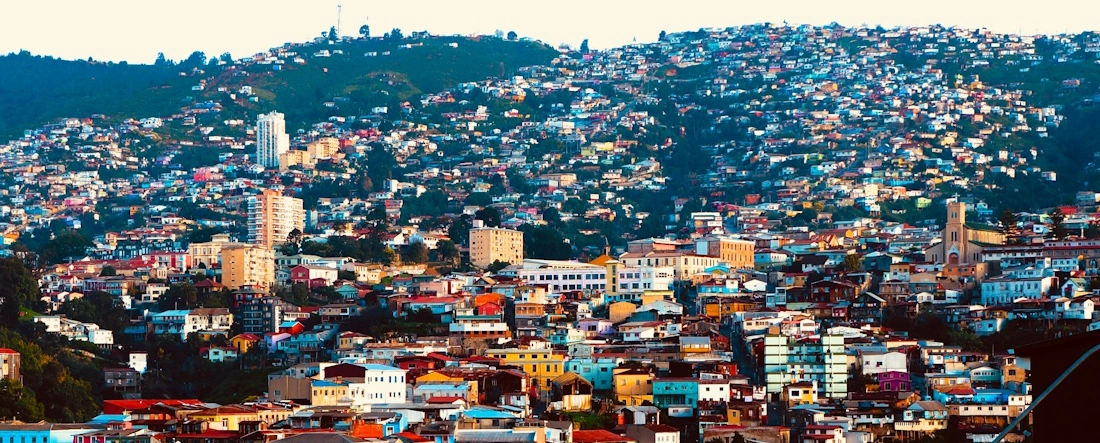
Finding the right home at the right price will require expats to do thorough research, especially if they’re looking for accommodation during peak season in tourist areas and large cities. That said, rent is often negotiable.
Furnished and unfurnished
Both furnished ( amoblado ) and unfurnished ( sin muebles ) options are available in Chilean cities. In either case, a full itinerary of the condition of furniture is critical when agreeing on the lease.
Unfurnished apartments will have limited furniture or appliances (usually ovens and hobs, sometimes light fittings and a couch or bed). It is typically possible to negotiate for other appliances as well. Furnished apartments come fully stocked, typically with necessary cooking utensils, crockery and cutlery.
For those seeking flexibility, short-term lets are a popular choice. These arrangements typically range from a few weeks to several months and are ideal for expats who are in Chile for a temporary period or are still exploring different areas before committing to a long-term lease. Short lets come in various forms, including serviced apartments, holiday rentals and Airbnb-style accommodation.
Serviced apartments offer a convenient option, as they are fully furnished and include utilities and cleaning services. This accommodation type is particularly popular in major cities and tourist areas. Holiday rentals, found in coastal regions and scenic areas, provide a homely experience for those wanting to explore Chile’s natural beauty. Airbnb and similar platforms also offer a vast range of short-term rental options, allowing expats to live like locals in both urban and rural settings.
When opting for a short lease, it’s essential to check the terms and conditions carefully, especially regarding deposits, utility charges and cancellation policies. These properties are often in high demand, especially in peak tourist seasons, so early booking is recommended.
For more information on short-term lets in Chile, visit Airbnb , Booking.com , Portalinmobiliario or Yapo.cl .
Finding accommodation in Chile
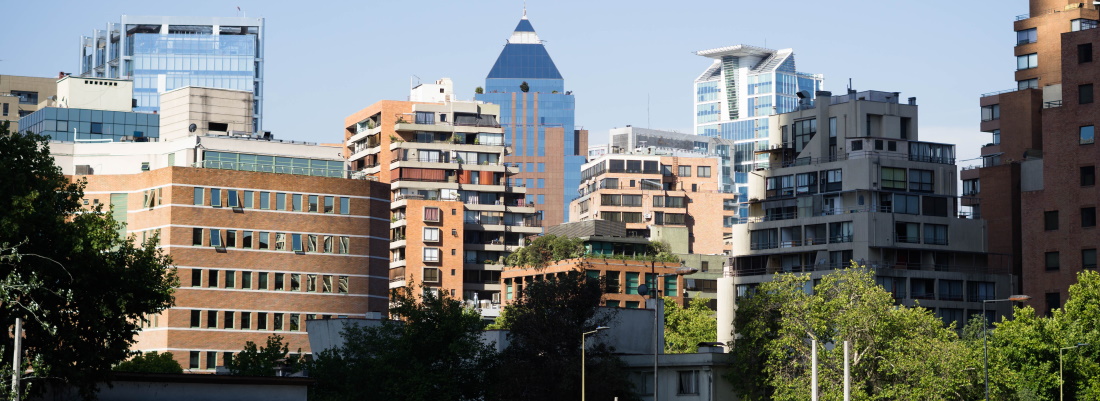
Several rental agencies cater specifically to the expat community in Chile’s major cities, while relocation companies take it a step further, offering a comprehensive range of services that cover the whole moving process. These service providers make finding accommodation and moving much more straightforward but costly.
Santiago’s daily newspapers generally have a property listing section, while many supermarkets have bulletin boards where properties for rent are advertised. Numerous online property portals such as CompartoDepto, Vivastreet and ACOP can be helpful in getting an idea of the property market and narrowing one’s search based on the preference of price, location and property type. Social media networking via Facebook is also common.
It can be beneficial to search for accommodation after arriving in Chile. Many expats initially find temporary accommodation or a hotel before finding a more permanent option. Being in Chile means expats can also drive through areas they like, scanning for ’ se arrienda’ signs.
Expats should do further research into locations like popular expat and tourist cities such as Viña del Mar, Valparaíso and, of course, areas and suburbs in Santiago . It’s important to consider the area where one chooses to live in Chile and its proximity to schools , shops, work and public transport links . Traffic congestion can be heavy in Santiago and other cities, so being close to specific amenities is an indispensable factor to consider.
Useful links
- CompartoDepto is a leading platform for finding shared accommodation and rooms for rent in Chile.
- Vivastreet is an online portal offering a wide range of rental properties, including houses and apartments in various Chilean cities.
- Portalinmobiliario is a comprehensive real estate website for finding all types of accommodations in Chile.
- Yapo.cl is a popular classifieds website in Chile where locals frequently list properties for rent.
- The website of the Chilean Real Estate Association offers resources and listings for various types of accommodation.
Renting accommodation in Chile
Rental agreements in Chile are either for an indefinite or a definite period. The more flexible leases allow tenants to leave after giving one month’s notice. Leases with a definite period are generally for 12 months. Overall, expats may be able to negotiate shorter or longer rents with a flexible landlord.
Depending on the landlord, expats may be required to have a Chilean guarantor to secure a rental contract. In most cases, an expat’s employer will act as a guarantor – otherwise, a lawyer or relocation company can assist in explaining the contract. When a guarantor is required but expats cannot find one, they can usually negotiate to pay a larger security deposit instead.
Rental agreements typically require a deposit of at least one month’s rent. A higher deposit may be required in some cases. Expats should always ensure the condition of the accommodation when securing the deposit and signing a lease.
Terminating the lease
Terminating a rental agreement in Chile requires attention to specific legal formalities. Tenants wishing to end their lease early should review their rental agreement for any clauses regarding early termination. For fixed-term leases, tenants are generally obliged to fulfil the lease duration unless an agreement is reached with the landlord.
In the case of an indefinite lease, tenants are typically required to give at least one month’s notice in writing. It’s advisable to communicate this intention as clearly as possible to avoid misunderstandings. The notice should be sent via a formal method, such as registered mail or a notarised letter, to ensure there is a record of the communication.
If a tenant leaves without giving proper notice or fulfilling the lease terms, they may forfeit their deposit. In some instances, landlords may even pursue legal action for breach of contract. Therefore, it is always recommended to adhere strictly to the terms set out in the lease agreement.
When a tenant needs to leave due to unforeseen circumstances, such as a job relocation or family emergency, it is often possible to negotiate an early termination with the landlord. Being transparent and providing ample notice can lead to a more amicable resolution.
Utilities in Chile

Electricity
In Chile, the electricity sector is predominantly in the hands of foreign and local private companies. Key players in the market include Enel Generación Chile, AES Andes, Colbún S.A., Suez Energy Andino and EE Guacolda. The sector primarily utilises hydroelectric power alongside oil, gas and coal, with an increasing contribution from wind and solar energy sources.
The standard voltage for electricity in Chile is 220V, and the frequency is 50Hz. Expats should be aware that the most commonly used plugs are Type C, which are two round pin plugs, and Type L, which are three round pin plugs. It is important for expats moving to Chile to ensure their electronic devices are compatible with these standards. Adaptors and converters might be necessary for appliances brought from countries with different electrical standards.
While not overly frequent, power outages in Chile do occur, especially during the rainy season. To protect sensitive electronic equipment, it is advisable to use surge protectors. Additionally, the electrical infrastructure in some older buildings may not be up to modern standards, including a lack of grounded outlets. Before renting a property, it’s recommended to check the condition and compatibility of the electrical infrastructure to avoid any inconveniences or safety issues.
For more information on electricity in Chile, including guidelines on electrical safety and standards, expats can visit the websites of major electricity providers like Enel Generación Chile and AES Andes .
In Chile, natural gas plays a crucial role in electricity generation, industrial applications and residential uses. The majority of natural gas is imported from Argentina through the GasAndes pipeline. Efforts are underway to expand the connection of residential users in larger cities to the gas transmission system.
ENAP is responsible for the importation and production of natural gas in Chile. Other companies involved in natural gas distribution include Metrogas, Gas Sur, Innergy Holdings, Gasnor and Gasmarket. These companies ensure the provision and distribution of gas across different regions of the country.
For heating and cooking purposes, residents have access to both piped and bottled gas. Piped gas is predominantly available in urban areas, while bottled gas is more commonly used in rural regions. Depending on the rental agreement, either the landlord or the tenant may arrange for the gas supply setup.
For further information on natural gas usage in Chile, including safety guidelines and service providers, you can visit the websites of ENAP and major gas distribution companies like Metrogas and Gasnor .
In Chile, Aguas Andinas is the largest water and sewage utility provider, catering to around 40 percent of the country’s population, including Santiago. This company plays a vital role in ensuring the supply of drinking water and the treatment of sewage within its service areas.
Chile stands out in Latin America for its water quality. A World Bank survey indicated it as one of the few countries in the region where tap water is considered safe to drink according to the US Centers for Disease Control. The country boasts 100 percent coverage in both drinking water and sanitation. Despite facing high water stress, Chile has one of the lowest rates of water supply shortfalls among surveyed countries.
For expats relocating to Chile, it’s reassuring to know that water quality is generally high and tap water is safe for consumption in most urban areas. However, in some rural regions, relying on bottled water may be advisable. Given the ongoing droughts and water scarcity issues, water conservation is a significant concern in Chile, and expats are encouraged to be mindful of their water usage.
To learn more about water services in Chile, including water quality and conservation efforts, you can visit the website of Aguas Andinas and other regional water service providers.
Bins and recycling
Chile is actively working towards enhancing its waste management and recycling capabilities as part of a broader commitment to achieving a circular economy by 2040. The country faces a significant challenge, with an estimated 17 million tons of municipal solid waste generated annually, of which only about 10 percent is currently recycled. This waste includes a considerable amount from households, amounting to around 6.5 million tons.
The recycling culture in Chile is still in its nascent stages, focusing mainly on materials like paper/cardboard, glass bottles, plastic bottles, aluminium cans and multilayer ‘tetrapak’ containers. Facilities for recycling electronics, batteries, tires, plastics, metal and printing cartridges are not widespread, making it more challenging for residents to recycle these materials.
The Chilean government has introduced the Extended Producer Responsibility Law, a significant step towards a sustainable future. This law prioritises the prevention of waste generation, followed by reuse, recycling and other recovery methods. It embodies the ’polluter pays’ principle, encouraging responsible waste management.
For expats living in Chile, understanding and participating in local recycling practices and waste management regulations is crucial. While the recycling infrastructure is evolving, there is an increasing demand for environmentally friendly solutions and technologies. Expats can contribute to Chile’s sustainability efforts by complying with local recycling practices and staying informed about waste management regulations.
For more information on recycling practices and waste management in Chile, expats can visit the official website of Chile’s Ministry of the Environment at Ministerio del Medio Ambiente .
Chile has a mature and modern telecommunications infrastructure. Key players in the market include Movistar, Entel and Claro.
Expats relocating to Chile will find that the country boasts a well-developed telecommunications network, particularly in urban areas, where access to reliable internet services is the norm. However, in more remote or rural regions, the availability of high-speed internet may be somewhat limited. This disparity is something the government is actively working to address, with ongoing commitments to increase investment in telecommunications infrastructure and bridge the digital gap.
When choosing an internet service provider in Chile, expats should consider the provider’s reputation for quality and reliability. It’s also important to be aware of local regulations governing telecommunications to ensure compliance and to make informed decisions regarding service subscriptions.
For more information on internet services in Chile and to explore options from leading providers, expats can visit the websites of companies like Movistar , Entel and Claro .
Buying property in Chile
Both Chileans and foreign citizens have rights without restrictions on buying property, except in some areas near the country’s borders. It’s not necessary to have full Chilean residency to buy property in the country.
Expats should investigate obtaining a tax number (RUT) and a Chilean ID number, allowing them to open a bank account. This is useful when transferring funds to the previous owner and obtaining a mortgage.
Expats should look out for " se vende " (for sale) signs, as well as adverts in local papers and online. If unable to speak Spanish, expats should have a friend or agent who is fluent to assist and translate throughout the process. When buying property, it is also important to hire a lawyer who is specialised in property law and can record the necessary details and draw up the contracts. The deed must be signed and stamped by all parties at the notary and then recorded at the inscription office called the Conservador de Bienes Raíces .
What do expats think of accommodation options in Chile? "For security reasons, most expats prefer to live in apartments with a shared communal garden or houses in gated condominiums. Some like to live in larger detached homes." Read about Nina ’ s experience with accommodation in Santiago. "Most new housing developments are on the outskirts of the city and are typical cookie-cutter suburbs. You need a car if you are going to live there. They seem to appeal to families rather than single people or couples without children." Noëlle chatted to us about how she found the standard of housing in Chile.
Further reading
►For information on opening a bank account and filing taxes, see Banking, Money and Taxes in Chile .
►Read more in Accommodation in Santiago when looking for a place to stay in the capital
Image credits: Crowded Valparaíso by Bailey Hall , Santiago Skyline by Caroline Pasasrin , Sky Costanera in Santiago by Caio Silva , all on Unsplash
Are you an expat living in Chile?
Expat Arrivals is looking for locals to contribute to this guide, and answer forum questions from others planning their move to Chile. Please contact us if you'd like to contribute.
Expat Health Insurance
Cigna Global Health Insurance. Medical insurance specifically designed for expats. With Cigna, you won't have to rely on foreign public health care systems, which may not meet your needs. Cigna allows you to speak to a doctor on demand, for consultations or instant advice, wherever you are in the world. They also offer full cancer care across all levels of cover, and settle the cost of treatments directly with the provider. Get a quote from Cigna Global - 20% off
Aetna Aetna International, offering comprehensive global medical coverage, has a network of 1.3 million medical providers worldwide. You will have the flexibility to choose from six areas of coverage, including worldwide, multiple levels of benefits to choose from, plus various optional benefits to meet your needs. Get your free no-obligation quotes now!
Moving Internationally?
International Movers. Get Quotes. Compare Prices. Sirelo has a network of more than 500 international removal companies that can move your furniture and possessions to your new home. By filling in a form, you’ll get up to 5 quotes from recommended movers. This service is free of charge and will help you select an international moving company that suits your needs and budget. Get your free no-obligation quotes from select removal companies now!
Free Moving Quotes ReloAdvisor is an independent online quote service for international moves. They work with hundreds of qualified international moving and relocation companies to match your individual requirements. Get up to 5 free quotes from moving companies that match your needs. Get your free no-obligation quotes now!


How to Study Abroad in Chile
by Farryl Last - Last updated on December 14, 2023
- Before You Go
Find yourself in any area of Chile and you’re in for an adventure. The county’s long and narrow outline holds just about every landscape you can dream up, spanning north to south from the dry Atacama Desert to the ice fields of Patagonia. Along the way, you’ll encounter volcanoes, rainforests, beaches, and enough charming towns and bustling cities to fill any vacation itinerary.
But if you really want to experience Chile’s culture and customs, studying abroad is the way to go. We’re here with good news if you’re wondering how to study abroad in Chile: The diversity of landscapes matches the diversity of ways to study abroad .
This is the place where quality academics come together with urban art and social scenes and those surreal landscapes you have to see to believe. Whether you’re looking to study in Chile in English or learn Spanish in Chile, there’s a program just waiting to deliver the most memorable days of your college career .
How to study abroad in Chile

Whether you want to study abroad in English or Spanish, there are options for you!
From adventure-inspiring contrasts in nature, climate, and topography to culturally rich urban centers, Chile gives you plenty of good reasons to make it your top study abroad destination. You have options, no matter your level of Spanish. Here’s how to get started:
1. Decide if you want to study in Spanish or English
Chile is a great place to learn Spanish thanks to the notoriously difficult Chilean dialect (yes, that’s a good thing!). Immersing yourself in the language here will make understanding other Spanish dialects easier. Even if you have years of Spanish under your belt, you’ll see your skills improve when you practice, practice, practice in Chile.
Prefer to study in Chile in English ? That’s totally possible, too. You can take various subjects taught in English while experiencing Chilean culture. All sorts of majors can study abroad in Chile and earn credits for their degree.
2. Decide when and where to go
Choosing where to study abroad is one of the biggest decisions you’ll make. You already know if you want to take classes in English or learn Spanish in Chile, so now it’s time to decide exactly where your study abroad journey will take you.
Maybe you’re drawn to big-name destinations like Viña del Mar, Valparaíso, or Santiago, or you hear a nontraditional city in Chile calling your name. No matter the experience you’re drawn to, you’re sure to find an ideal home away from home somewhere between the Atacama Desert in the north and Patagonia’s glaciers in the south.
Equally important? Deciding when—and for how long —you’ll study abroad. With everything from short-term language immersion programs to full semester and year-long programs available, Chile makes it easy to find a time to study abroad that works well with your academic goals and travel dreams.
3. Inquire at your university and look for programs
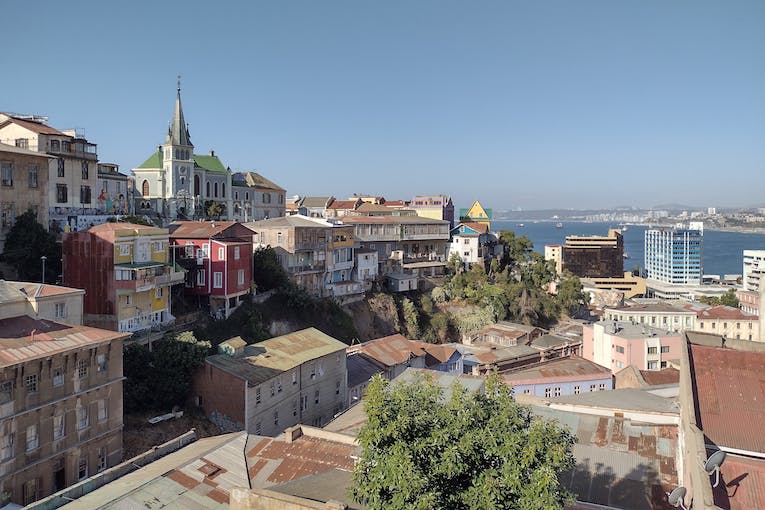
If your university doesn’t offer programs in Chile, don’t worry—you still have options.
Before you start filling out any applications, check with folks at your university to put your plans to study abroad in Chile in motion. Your university may have exchange agreements with universities in Chile, or they may have programs or providers they’ve worked with before to recommend.
Make sure to speak with your study abroad advisor to ensure your home school approves of your program choice—and to stay on top of any requirements your school has for you before you go, like planning out the courses you’ll take in Chile. Taking time to do your research now will go a long way to ensuring a smooth transition to life in Chile later on.
4. Choose a program
Whether your university has program recommendations for you or you’re choosing a program on your own, consider your goals for your time abroad while comparing study abroad programs .
Are there courses you’re interested in taking in English or at the right level of Spanish for you? Are there ways to get involved with the local community, like international student groups or opportunities to volunteer while studying abroad?
Knowing the type of experience you want—whether that’s diving into an intensive language immersion or earning academic credits in English—can help you narrow down your options. Research places in Chile you’d like to call home for semester , summer , or academic year to find the program that’s right for you.
5. Apply for programs and scholarships

Apply for your preferred programs and funding opportunities ASAP.
Now that you’ve found your perfect program, it’s time to hit send on that application. Make sure you meet program requirements and have everything you need (think: transcripts, essays, letters of recommendation) to submit a great application.
You’ll also want to apply for scholarships and financial aid to make your time in Chile more affordable. Trust us, it is possible to get scholarships for study abroad , so do your research now to make paying for your time abroad easier!
6. Gather documents, book flights—and start your study abroad adventure
Depending on your citizenship and how long you plan to stay in Chile, you may need a student visa to enter Chile, or you may enter on a tourist visa and extend your visa after arrival. Your program staff can help you figure out visa requirements . And don’t forget, you’ll definitely need a passport to travel abroad, so now is the time to apply for a passport if you don’t yet have one!
Get yourself organized by creating a checklist of all your to-dos before departure. That includes booking your flight , packing your bags , and getting excited for all the nature, culture, and top-notch academics you’ll experience in Chile.
Get matched with 5 study abroad programs in Chile—for free!
4 ways to learn spanish in chile.
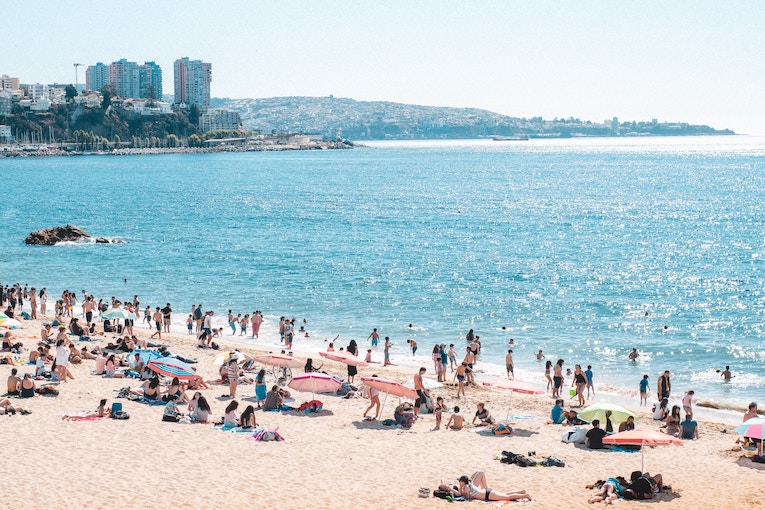
Semester, summer, academic year, intensive—which one is right for you?
When you decide to learn Spanish abroad , you’re giving yourself the gift of full-time language immersion. So, wondering how to learn Spanish in Chile? Considering the pros and cons of different options will help you find the right path for you:
1. Summer Spanish programs in Chile
Though semesters abroad square more closely with what people consider the quintessential study abroad experience, a summer studying Spanish in Chile might just be the experience you need. Studying abroad in the summer comes with some serious benefits.
With a summer in Chile, you can earn more credits and jumpstart your language skills in less time. Less time means more flexibility, both in terms of academic planning—you won’t need to worry about missing out on regular semesters and required classes back home— and budgeting .
The shorter time frame means you’ll save on daily costs for things like accommodations and meals. However, you won’t get as much language immersion and time in Chile as you would with other options.
2. Study Spanish in Chile during the semester
The longer you stay abroad, the more you’ll get to practice the language. A Spanish semester program means more time in class and more time speaking the local language with locals , which translates to exponential growth in your language abilities.
You simply can’t beat real-world immersion when it comes to boosting your fluency in Spanish. Put that together with in-class instruction at your language level, and studying abroad for a fall or spring semester can power your language-learning journey in ways you just can’t get by studying from a textbook in class back home.
Of course, there are downsides to semester-long study abroad programs, too. You’ll spend a longer time away from family and friends, and you’ll have to budget for a longer time abroad. However, you’ll find many study abroad scholarships that are only available for longer periods abroad, so opting for a full semester might just open the door to more funding.
3. Learn Spanish in Chile for a year
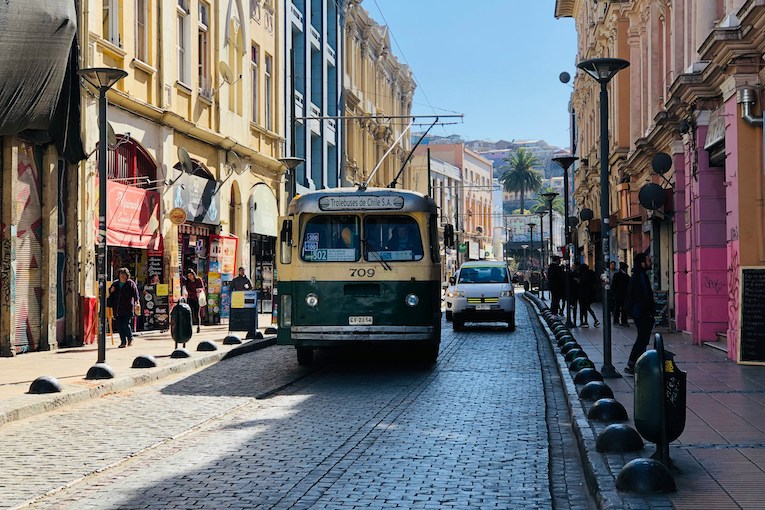
Spending an entire year in Chile will completely transform your Spanish skills.
If you’re wondering how to learn Spanish in Chile and really want to maximize your learning, studying abroad for a year in Chile can get you there. Think of a year abroad as heightening both the good and bad sides of a semester.
Sure, you’ll have more time to feel homesick, and you’ll have to fund program costs and the daily cost of living abroad for a whole year. But you’ll also get even more opportunities for intercultural learning and Spanish practice. That’s a whole year of ordering seafood in Spanish, chatting with your local friends on beach days and nights out, and learning the language from experienced teachers.
4. Intensive Spanish in Chile
It bears repeating: Learning a language abroad is the best way to learn a language . Focus your time in Chile on Spanish classes and you’ll see your abilities soar.
You’ll complement in-class instruction with exposure to Chilean culture, building cultural awareness while studying one of the best languages to learn for the future . An intensive Spanish program lets you make honing your language skills the bedrock of your time abroad. We bet you’ll gain some insight into your own future while you’re at it.
Are you ready to study abroad in Chile?
Maybe you’ve been counting down the days until you could study abroad in Latin America since you were first applying for college, or maybe you’ve just recently put Chile on your internal map of places to study. Whatever got you here—and whatever you want to study—it’s time to let Chile show you why it’s the ultimate place to study abroad.
Explore ALL Study Abroad Programs in Chile on GoAbroad.com
This article was written with help from Universidad De Viña Del Mar - Chile . UVM is located in historical Valparaiso, just an hour and a half away from Santiago. Their goal is to provide access to quality education while fostering student growth and integrity.

Want to Get Matched with Programs?

Use MyGoAbroad to Save & Compare Programs!
Related articles, why study abroad in chile, study abroad in chile in these nontraditional cities, should i study abroad or just travel, your essential study abroad scholarship timeline, should i study abroad in australia or europe, why is intercultural learning important, popular searches, recommended programs.

University Studies Abroad Consortium

CIEE Study Abroad
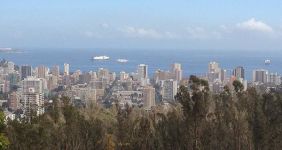
American Institute For Foreign Study
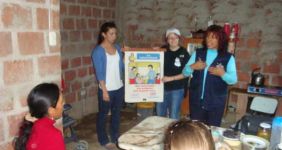
SIT Study Abroad
For Travelers
Travel resources, for partners.

© Copyright 1998 - 2024 GoAbroad.com ®
- Study Abroad
- Volunteer Abroad
- Intern Abroad
- Teach Abroad
- TEFL Courses
- Degrees Abroad
- High School Abroad
- Language Schools
- Adventure Travel
- Jobs Abroad
- Online Study Abroad
- Online Volunteer Programs
- Online Internships
- Online Language Courses
- Online Teaching Jobs
- Online Jobs
- Online TEFL Courses
- Online Degree Programs

Living Accommodations for Santiago, Chile
You will move in with your host family after orientation. The families are located within a 30- to 50-minute commute to the university and will provide you with a room, breakfast and dinner daily. Lunch, the main meal in Chile, is available in the university neighborhood at a modest cost. Boarding with a family provides an unmatched opportunity for practicing your Spanish and learning Chilean culture and customs and is highly recommended.
Staying in a homestay in Santiago will provide you with a synthesis of a big Latin American capital city coupled with the atmosphere of a local Chilean neighborhood; the neighborhoods of Providencia, Las Condes, and Ñuñoa mix residences and offices with small streets and expansive avenues, commercial centers, traditional boutiques, parks, and plazas. Areas with cafes, restaurants, and cinemas can be found in different parts of the city with a diversity of styles and local cultures.
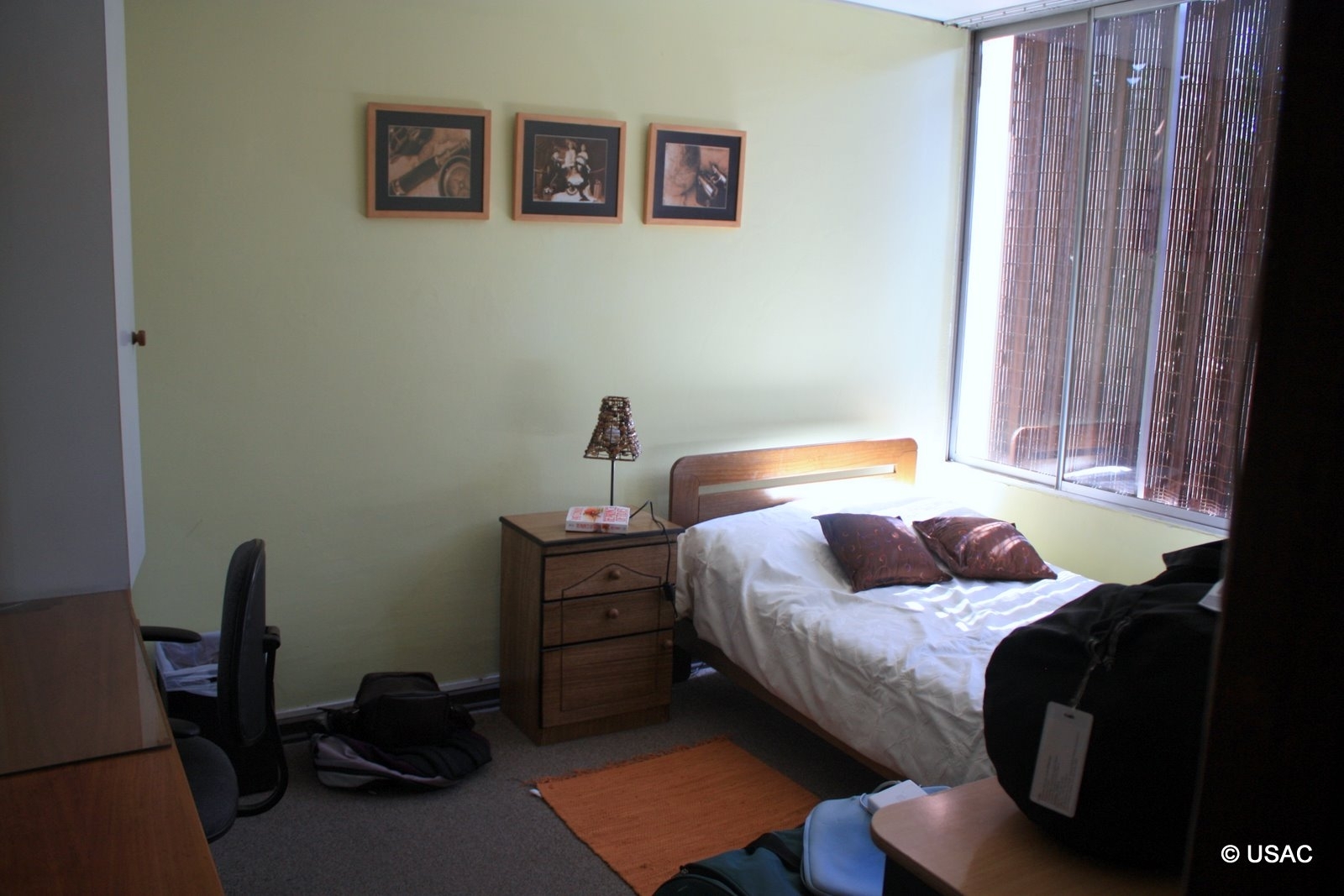
Shared Apartments
(Not available during Summer)
There are private rooms and shared rooms (two people) available, as well as private or shared bathrooms depending on the room chosen/available. Each apartment has a small study area and a kitchen. Depending on the building there may be other facilities available, such as a laundry room, gym, swimming pool, bikes, and grills for barbecues. The apartments are conveniently located in downtown Santiago and are only a 10-minute commute by metro to get to campus. In apartments, students will live with other USAC students.
To choose a privately owned residence hall or rental apartment, you will be responsible to locate and make your own rental agreements.
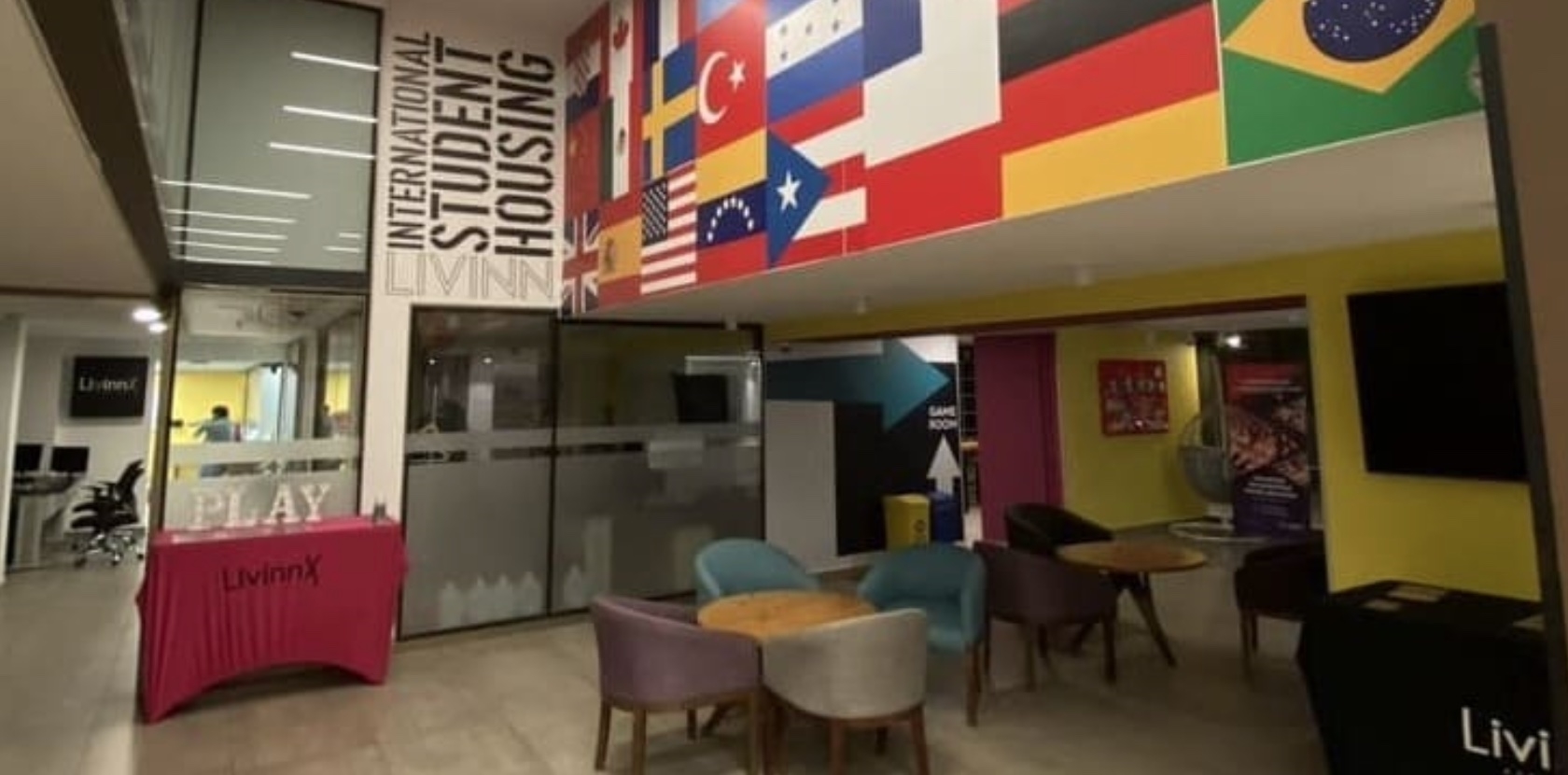
UNIVERSIDAD DE CHILE | FEN.UCHILE
INTERNATIONAL OFFICE
EXCELLENCE AND GLOBAL VISION
Please note: It is the exchange student´s responsibility to arrange their housing, as the Universidad de Chile nor FEN provides residence halls or dorms for its students. Housing arrangements and housing agreements are directly between the student and the property owner.
Download the FEN Housing Guide here:
FEN Health and Housing Guide
Neighbourhoods of Santiago
ACREDITACIONES
NEXOINTERNACIONAL Diagonal Paraguay 205 Santiago de Chile - Código Postal 0023456 [email protected] / Teléfono (+56) 2 2978 3911 Escuelas de Pregrado FEN-UChile
You are using an outdated browser. Please upgrade your browser or activate Google Chrome Frame to improve your experience.
- Follow Contactchile on instagram
- Follow Contactchile on facebook
Housing Services
Moving abroad often involves a lot of stress and bureaucracy, and it can be difficult to find a new home in Chile to match particular needs .
By using ContactChile’s extensive data base you can decide even before your departure where you would like to live in Santiago. So you have a place to stay for the first few weeks.
Once you arrive in Chile, we will be at your side and together with you we will look for a permanent apartment or house for your time in Chile. We will advise you on the choice of the residential area, help you to check rental offers, accompany you to viewing appointments and mediate in the conclusion of the rental contract. Buying equipment, getting telephone, internet and cable TV connected, hiring a capable and trustworthy housekeeper - ContactChile will advise and organize everything according to your wishes.
Interested? Please use the quick inquiry on the right to contact us!
Work & Travel
Spanish Course
High School
Tel. +56 2 2264 1719
Tel. +56 9 7764 4148
WhatsApp +56 9 7764 4148
We are member of


Alojamiento
RESIDENCIALES
Opción de alojamiento para estudiantes que no desean vivir con Familias Anfitrionas (Exclusivo Programas de Larga Duración) .
Nuestro staff proveerá a los estudiantes con una lista de sitios donde podrán encontrar lugares que coincidan con su gusto y presupuesto. Los estudiantes que elijan vivir en este tipo de alojamiento son responsables de las negociaciones que hagan al respecto. La Universidad no puede figurar como intermediario.
Sitios de Referencia
¿Necesitas ayuda para encontrar Alojamiento en Valparaíso? Te invitamos a visitar “Travel Abroad Chile Housing” , que reúne información acerca de Hostales y Residenciales disponibles para estudiantes en Valparaíso.
- Travel Abroad Chile Housing
Para más información consulta a:
Sergio García [email protected] Teléfono 322273567
Also available in : English , Português
FAMILIAS ANFITRIONAS
Te invitamos a revisar nuestras secciones de información:
- Alojamiento con Familias Anfitrionas para Long Term Programs
- Alojamiento con Familias Anfitrionas para Short Term Programs
Artículos relacionados
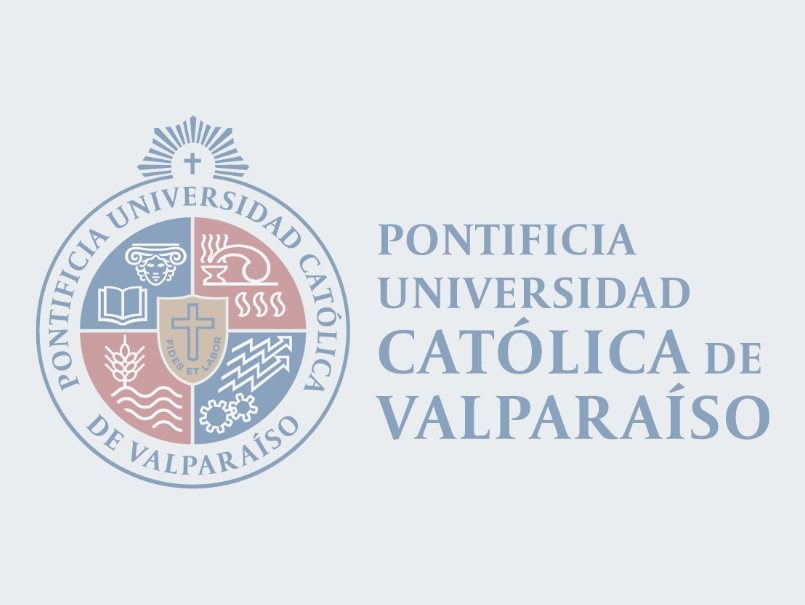
- Skip to primary navigation
- Skip to main content
- Skip to primary sidebar
- Skip to footer
International Citizens Group
Resources for International Citizens and Expatriates
Moving to Chile: What You Need to Know
How to prepare for moving to chile.
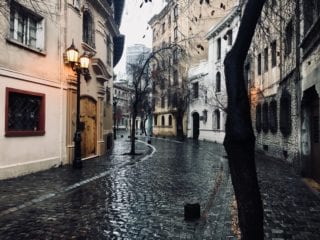
1. Learn the Language and Culture
Speaking Spanish is essential if you’re considering moving to Chile. Approximately 95% of the population speaks fluent Spanish. The remaining 5% speak Indigenous languages such as Mapudungun. While English is common among business professionals, university students, and those in the tourism industry, Spanish remains very much the language of everyday life.
Chilean Spanish is very different from European Spanish (though speaking it definitely gives you a boost when you first move to Chile). Long sentences, puns, and wordplay are hallmarks of conversational Chilean Spanish. Locals are proud of their distinct vocabulary, expressions, even their accents which differ from other Latin American countries. It’s well worth the effort to take language classes. Locals will be thrilled by your efforts to engage in casual conversation.
2. Find a Job in Chile
Nothing is so important to job searching in Chile than “pituto”. Roughly translated as “personal network”, pituto is like a living form of LinkedIn. At best, pituto demonstrates how friends support each other in a job hunt. At worst, it’s a controlling factor in the so-called hidden job market. Many positions in Chile are never even advertised, thanks to pituto.
As international citizens cannot beat the pituto system, they must create one of their own. Joining sports clubs, volunteering for a cause, participating in neighborhood activities, and being extra social at work all go a long way to creating a local personal network. It’s hard to find a new job in Chile without it.
3. Understand the Cost of Living
In Chile, housing, local food, fuel, and public transportation are generally considered affordable. Luxuries, like restaurant meals and imported luxury goods, are disproportionately expensive. But an unexpected budget-buster is utilities. Utility payments are not included in most rental units. Chile does not have any cheap energy reserves of its own and thus needs to import. As such, the increased cost of imported energy means that water, electricity, and heat are all very expensive.
4. Find a Place to Live
Finding a comfortable, affordable place to live usually isn’t a problem in Chile. While some of the trendier neighborhoods in Santiago might have limited availability, in general, there is a good selection of options.
The first and last month’s rent are standard conditions. As well, you may also need a Chilean guarantor to co-sign on your behalf. For this reason, many expatriates opt to work with a property agent to help them find their new home. Property agents are also invaluable for two other aspects of the process. They can help translate the contracts so you know exactly what you are signing. Furthermore, they can also negotiate on your behalf to see if you can get a better price or terms.
In popular holiday destinations, short-term leases are usually an option. In cities like Santiago, 12-month terms are the norm. And when it comes to unfurnished properties, landlords may press for a longer lease. They likely assume since you’ll be buying furniture, you’re committed to staying in Chile for a while. They want you to stay in their property!
5. Understand the Healthcare System
Chile has a very good public healthcare system that’s widely considered to be the best in South America. The public program, known as FONASA , covers any resident paying into the system via payroll taxes. FONASA covers the cost of primary care, emergency care, specialist care, hospitalization, maternity care, and more. It also provides care for the unemployed, pregnant women, people with disabilities, and those who are poor. Approximately 78% of the population is covered by FONASA. The remaining 22% are covered either through similar programs which are designed for their specific profession or they opt for private insurance.
Foreigners moving to Chile are eligible to be part of the healthcare system if they are working and have legal residency. Many expats also opt to have private health insurance, whether or not they’re a part of FONASA. While the hospitals in Chile in cities and larger towns are excellent, medical care in small communities is more basic. Private insurance means more comfortable and private facilities. Patients can also expect reduced wait times. Finally, most doctors in private facilities are bilingual.
Best Private Health Insurance for Expats in Chile

Cigna Global Medical Plan
- Flexibility to tailor plans to suit your individual needs
- Access to Cigna Global’s network of trusted doctors
- Convenience and confidence of 24/7/365 customer service
Best Health Insurance for US Citizens in Chile

Xplorer Worldwide Medical Plan
- Premium Benefits, Coverage and Service
- Define your deductible and prescription benefits
- For Foreigners in the US or US Citizens Abroad
Read: Health Insurance in Chile

6. How is the Education System
The poor quality of Chile’s public education system is a common complaint among expats. The public system is managed by municipalities. This helps explain why there are stark differences in standards between different regions.
Chile uses an education voucher system in its public schools. It’s designed to grant all children access to education regardless of their financial background. Income is not a factor in distributing the vouchers. As such, rich families can afford to top up their vouchers and buy their way into better schools. Meanwhile poor and middle-class families have just the basics.
In Chile, the school year runs from March to December. There is a two-week break for the winter holidays in July. The summer holidays run from December to March. July and August are enrollment months when prospective students are enrolled for the next year. The children of expats are required to pass an exam before they begin primary or high school. The exams take place in March and July.
7. Set Up a Bank Account in Chile
The Peso is the national currency of Chile. It is abbreviated as CLP. It also uses the “$” just like the US dollar. Speaking of which, US dollars are widely accepted in Chile at tourism hot spots. However, they are much less common at small community businesses.
For expats moving to Chile, opening a bank account so they can easily spend Pesos is easier said than done. Banking policies in Chile discourage expats from opening local accounts. Furthermore, even when it is possible, the vetting process is very strict. A Chilean residency card is required to open a local bank account. It’s the only form of personal identification that’s accepted. Not even a passport will do! Furthermore, expats need to have their tax number or “RUT” on hand. Just getting a tax number and a residency card are lengthy processes on their own. This isn’t something that just happens overnight!
Even with these two important items, the process isn’t over. Applicants must fill out an F4415 tax administration form. They must also provide proof of their Chilean income. As well, some banks require a first deposit that meets a minimum amount. Last but not least, only expats who have stayed in Chile for at least two years can open accounts with a local bank.
Alternatives to Regular Bank Accounts
For foreigners waiting for the process to resolve, there are two interim solutions. They can open a RUT account, which is a kind of savings account. Account-holders can use an ATM card, make local payments, and make money transfers. The other option is a fondos mutuos account. This is fixed savings account with a static interest rate. While you can withdraw your money prior to the maturation date, you will attract penalties and forfeit any accrued interest if you do. However, if you keep your money in place throughout the entirety of the investment term, you will be rewarded with a high interest rate.
Related: Moving Abroad Checklist Request Moving Quotes and Compare Prices Five Tips for Becoming an Expat
Let us help you with your insurance needs
Expat advice, popular resources, travel plans, featured articles.
What are the Most Expensive Countries in the World to Live In? Define Expatriate – What is an Expat Anyway? Best, and Safest, Places to Live, or Retire, In Mexico! International Retirement: The Best Places to Retire Abroad Expat? Expatriate Resources
Company Info

- Living the Expat Life
- Five Tips for Becoming an Expat
- Expat Forums, Twitter and Social Networks
- 5 Common Problems Faced by Expatriates
- How to Move Abroad to Popular Expat Locations
- Moving Abroad Checklist
- Education Abroad
- Retire in a New Country
- Best Places to Work in the World
- How to Apply for Citizenship
- US Work Visas for Foreigners
- International Citizens Blog
- Traveling Abroad
- Best Places to Live Abroad
- Safest Places In the World to Live
- Cost of Living Abroad
- International Calling Codes
- Health and Wellness Advice for Expats
- Hospital Search
- International Tax Advice
- Living on Social Security While Abroad?
- Taxation of American Expats
- International EORs and PEOs
- Expatriate Selection: Lessons From the U.S. Peace Corps
- Expatriate Stigmatization: How HR Professionals Can Combat this Underestimated Challenge
- Perceived Organizational Support: Fundamental to Expat Success
- Pre-Departure Preparation and Training: The Role of HR
- Understanding and Preventing Expat Failure

- Group booking
- Properties for rent
- Marketplace
- Account settings
- My bookings
- My wishlist
- Recently viewed
- My requests
- Help Center
- How it works
- Global access number +1 512 399 0007
Student accommodation options in Chile
Find out more about our most popular Chile cities and universities for student housing by selecting below or try searching by university, city or neighborhood.
Guide to studying and renting a house in Chile
Ai-powered learning revolution: how tech supercharges your studies, exam success strategies: your ultimate guide for the academic final stretch, transforming travel into a career path: a comprehensive guide, the ultimate student guide to traveling smart and embracing global citizenship, popular student accommodation for cities in chile, popular student accommodation for universities in chile.
- Classifieds
- Chile Guide
- Housing & Rentals
Starting out
Where to live in chile.

Chile - Housing & Rentals

So you want to move to Chile? Whether it’s the lure of a job, or the chance to retire in style, Chile offers a chance to enjoy life in one of South America’s most inviting countries.
A country of diverse appeal
Viña del mar.
By Just Landed
- Share on Facebook
- Share on Twitter
- Share on LinkedIn
Further reading
- Chilean rental market for expats: Low rents and few restrictions
- Finding your home in Chile: Maximise your options and avoid hassle
- Deposits and agreements: Contracts and utilities in Chile
Does this article help?
Do you have any comments, updates or questions on this topic? Ask them here:
- Testimonials
- Helpful Resources
- Request Information

- Czech Republic
- New Zealand
- South Africa
- South Korea
- Spain (Seville)
- Spain (Valencia)
Valparaiso, Chile
- About the Program
- Culture Corner
- What's Included
- Intensive Term 2024
- Spring 2024
- Summer 2024
- Intensive Term 2025
- Spring 2025
- Ministry Opportunities
- On-Site Office & Staff
- Student Testimonials
- Photo Gallery
- Prices & Dates
Living in ISA housing will give you the opportunity to experience aspects of the Chilean lifestyle that are inaccessible to the average visitor to Chile. With an open-mind and flexibility, the experience of living in another culture can be highly rewarding.
We strive to match your housing preferences with our available accommodations; however, housing preference requests cannot be guaranteed..
All Veritas participants will live in homestays with Chilean families. Host families are amazing as you will get a full linguistic and cultural immersion during your time abroad. Each host family has been carefully selected by ISA's resident staff in order to best accommodate your needs and to ensure a comfortable living situation. Homestays will provide breakfast, lunch, and dinner seven days a week and laundry service once a week. You will typically have your own bedroom but will likely have another ISA student of the same gender as a housemate.
Independent Housing
You may elect to secure housing independently. If you select this option, you will receive a discount equal to the housing portion of the program price.
These are the new measures for travelers returning to or entering Chile from abroad
Starting on wednesday, march 31 at 5am, anyone entering chile from abroad must complete 10 days mandatory quarantine, with no exemptions. the first 5 days must be carried out at a quarantine hotel especially for travelers where they will undergo a pcr test. learn more about the new measures here..
Starting at 5am on Wednesday, March 31, new measures go into effect for travelers entering Chile from anywhere in the world.
PCR TEST IN ORDER TO LEAVE HOTEL
COSTS ASSOCIATED WITH HOTEL ACCOMODATIONS Chilean Nationals or Residents All costs for accommodations at the quarantine hotel or hotel authorized by the Health SEREMI must be paid for by each traveler.
Non-resident foreigners All costs for accommodations at the quarantine hotel must be paid for by each traveler upon receiving their health passport (at website: www.c19.cl ) before boarding flights to Chile.
* The quarantine hotel will be assigned according to availability upon entering Chile.
How do quarantine hotels work for travelers?
Each person must go to the website www.c19.cl and complete their personal information in order to obtain the health passport. They will then be given information on quarantine hotel availability for preventive quarantine for arriving passengers. This information will be available before the regulation goes into effect.
In the event that no reservation was made online, health officials will assign one to the passenger prior to their arrival at the airport.
These quarantine hotels will be managed by travel agencies authorized by the Health Ministry (MINSAL). They will handle the logistics for those who make reservations according to availability on the c19.cl website. Travelers are not allowed to make reservations without using these authorized agencies. The base rate for the five days start at 480,000 Chilean pesos (US$670). These agencies will also be in charge of the logistics of transfers from the airport to the hotel.
Reservations are key for non-resident foreigners. The health passport will not be issued without a reservation at a quarantine hotel.
As for Chilean nationals and foreign residents, if they left Chile before Sunday, March 28, they must attach proof of exit on the c19.cl website so that the travel agency can assign the hotel free of charge. Of course there is the option of staying at a different hotel than the one assigned, but in that case all costs are the responsibility of the passenger.
Anyone who exited Chile on Sunday, March 28 or after must make their reservation online and will be able to pay through the link on the MINSAL website or at the airport. Proof of purchase must be shown at the Health Customs checkpoint.
▶ More information is available at saludresponde.minsal.cl/preguntas-frecuentes-viajeros-extranjeros
▶ Download the flyer in PDF format with Information for travelers arriving to Chile, here
Follow us on our social media:
- College Study Abroad
- Study Abroad Programs
Summer Global Internship
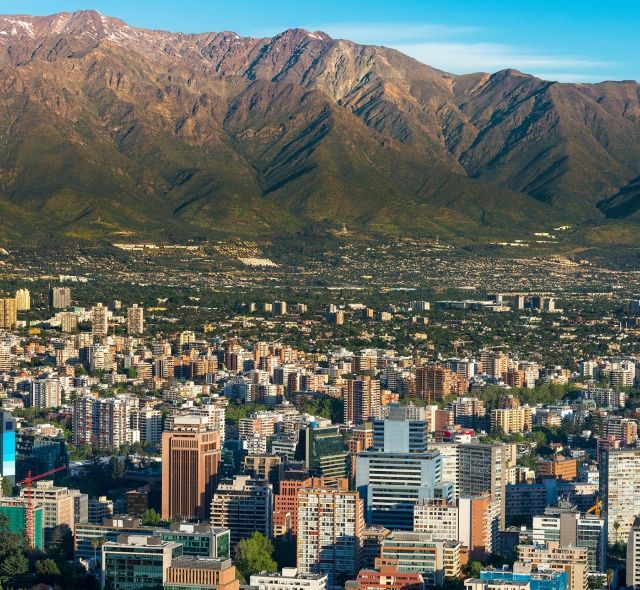
Jun 17 - Aug 10, 2024
6 semester hours
9 quarter hours
Eligibility
2.5 Overall GPA
Application Deadline
The application deadline has passed.
Request Information
Spend your summer gaining real-world work experience in Santiago, where you'll immerse yourself in a new culture, develop new professional skills, and expand your intercultural competence. Whether you intern at a local Chilean company, an NGO, a startup, or a small or medium international company with headquarters in Santiago, you'll find yourself networking with a wide range of contacts throughout Chile as a result of the country's political and economic significance in Latin America.
CIEE Santiago allows students to choose between English-speaking or Spanish-speaking internship placements. Industries vary from human rights, political science, business, engineering, astronomy, sciences, education, arts, marketing, design, and more.

Unique Experiences
Work in one of the largest cities in the americas.
Home to many global corporations and international companies that choose Chile as their regional headquarters, Santiago has become a start-up and entrepreneurship hub of southern hemisphere countries.
Learn from a "smart city"
at the forefront of the most innovative and developed renewable energy initiatives in Latin America.
Live in a modern metropolis
with the second largest railway in South America, Santiago’s subway is working to become the first in the world to run mostly on solar energy.
see the Andes from Santiago's Tower in the financial district
daily passengers on Santiago's subway
miles of urban cycling paths
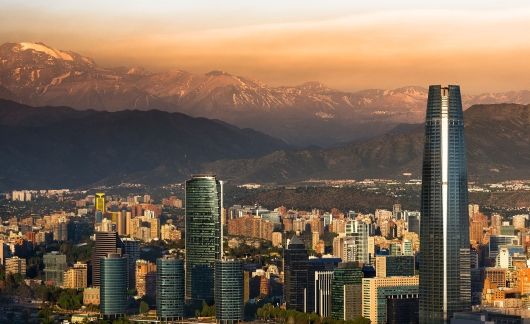
Your Destination
With over 7 million residents, Santiago is the most populated city in Chile, with a rich cultural identity mixed with other Latin American and European cultures. Santiago is considered one of the "smartest” cities in Latin America due to its achievements in sustainable development, leading in renewable energies and innovation investments in the region.
Santiago, the capital of Chile, is a 40-minute drive away from international ski resorts in the Andes mountains, one hour away from vineyards in Maipo and Central valley, with large parks, natural reserves, and a two-hour drive to the beaches of the central Pacific coast extending to Viña del Mar, Valparaíso, and Algarrobo where surfing and other water sports can be practiced.
Learn more about Santiago and see past internship examples »
CIEE wants all our students to feel welcomed, supported, and empowered to succeed while studying abroad. Local CIEE staff have provided details about conditions and cultural attitudes that students with specific identities might encounter in Santiago.
The Culture

Excursions & Activities
- Attend weekly lectures and guided tours of important companies to better understand the works of both entrepreneurs and big international companies from different business areas.
- Experience the beauty of the Andes Mountains with optional trekking activities in Cajón del Maipo and other places within the city.
- Explore the history and the arts of Chile with cultural activities including a tour of the city's landmarks and visits to museums.
- Visit green vineyards and learn about Chile’s wine exportation industry and why it is one of the great economic engines of the country.

Professional Development
- Further develop your multicultural skills, highly valued in today’s professional environment, being an international intern in the regional business hub of South America and the most vibrant economy of Latin America in Santiago, Chile..
- Prepare yourself and learn outside of classroom and work through site visits to corporations and small companies, participating in industry networking events, and expanding your knowledge through lectures by expert guest speakers.
- Participate in workshops that will help you make the most of your internship in a guided environment to reflect on the professional and cultural exposure.
Program Blogs
Ciee santiago open campus block 1/2.
Santiago, Chile is such a beautiful city! From going to the hill of San Cristobal, the numerous artisan markets, seeing the wonderful architecture, going to vibrant parks, and countless fascinating... keep reading

Embarking on a Cultural Odyssey: The CIEE Santiago January Exchange Unveiled
Santiago's vibrant tapestry provids the backdrop for weeks filled with enriching encounters and memorable moments. Although, not primarily a language-oriented program, the immersion component stands out as daily interactions with... keep reading

Studying in Santiago on Summer
Studying abroad as an exchange student in Santiago de Chile during summer is a unique and enriching experience. The city is known for its vibrant culture, rich history, and stunning... keep reading
- Activities & Excursions
- Food & Drink
Housing & Meals
CIEE Santiago offers diverse housing options to ensure you're comfortable in your home away from home. From homestays to residence halls, we will strive for your accommodation preferences to be met. Homestays are ideal for students who wish to experience living with local families in apartments or houses within a 45-minute commute from CIEE Santiago de Chile center. Residence halls are located within a 40-minute commute to CIEE Santiago de Chile center.
Standard Housing: Includes a private room (single or double placement with another CIEE student) in the residence of a host family. Homestays feature weekly laundry, Wi-Fi, and two meals per day. Homestays are nearby subway stations and public transportation, coffee shops, convenience stores, ATMs available in metro stations, restaurants, and other amenities.
Non-homestay standard housing: Includes a triple room or double in a shared apartment in a residence hall located within 40 minutes to CIEE Santiago de Chile Center. Students can prepare their meals in the facility and access study areas and other amenities. There is a monthly fee for utilities associated to this option paid locally.
Select Housing: Includes a single room in a residence hall. Residence halls are located roughly five minutes (on foot) from a subway station that connects with the rest of Santiago (a 40-minute commute to local university campuses). Select housing requires an additional fee and a monthly fee for utilities.
A note: Housing is on a first-come, first-served basis. If we cannot accommodate your first housing choice, we’ll let you know before you arrive.
Homestays include two meals per day. Host families and students arrange their own meal schedules. Students are responsible for the remaining meal, either preparing it at home or eating in one of many restaurants and cafés throughout the city. Students who are staying for a full year are responsible for their meals during breaks between semesters.
Transportation
Commute time from housing location to internship will vary depending on the location of the internship provider.

A student with her host family.
Homestay room
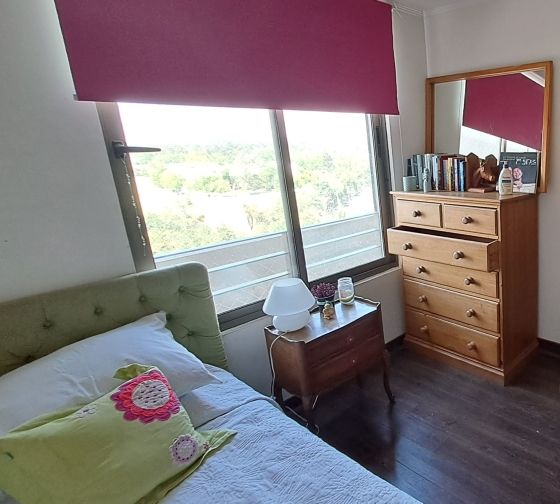
Merken, a seasoning used in Chilean cuisine.
As a global intern in Santiago, you’ll be assigned in a non-paying position within a wide range of business aligned with your interests to help you boost your employability and future job performance. Co-curricular and cultural activities in and around Santiago complement your coursework and will immerse you in the history and culture of the Chilean people.
This eight-week program includes a full-time internship and an integrated online academic course.
Please refer to the detailed Program Essential Eligibility Criteria .
Language Requirements
There are no specific language requirements for this program.
Additional Requirements
For more information, refer to the detailed Program Essential Eligibility Criteria .
Rising sophomore standing and above required at time of participation. *Additional visa restrictions may apply and CIEE will advise students as part of the early application process.
Individual courses may have additional prerequisites; for CIEE courses, these are listed in the syllabi below. Students are responsible for having their own course approval conversations with their advisors.
Requirements
Students participate in an academic course taught in a hybrid learning environment alongside the eight-week, full-time internship. Participation in the integrated academic course and internship are mandatory for all participants.
Program Credit
Total credit: 6 U.S. semester/9 quarter credits
Course Credit
Internship: 6 U.S. semester/9 quarter credits; 15 integrated academic course hours, 225-300 internship placement hours
Academic Culture
Students are expected to dress and behave professionally throughout their internship project and are subject to the agreed-upon internship protocols arranged by CIEE and the host companies and organizations. The academic course is designed to prepare students for leadership in a globally interdependent and culturally diverse workforce.
Class Format
Students participate in an eight-week CIEE full-time internship and academic course taught in an online learning environment. Class and/or work hours may be scheduled Monday-Friday, and attendance is strictly enforced for all. To avoid falling behind, students should not plan personal travel away from the city when classes are in session.
Students will be assessed via assignments and activities related to the academic course, including but not limited to, online discussion forums, reflective papers, individual or group presentations, analysis of readings, an internship work plan, and feedback from internship supervisor. Internship supervisors and students each provide written evaluations of progress towards goals.
Language of Instruction
Internship opportunities.
Gain real-world work experience, grow your professional network, and bolster your resume while interning at NGOs, social organizations, non-profits, startups, and more in Santiago. Search here for a more detailed list of internship opportunities.
Business, Finance, and Accounting Business development, corporate finance, investment banking, insurance, financial communications, real estate, human resources, and recruitment.
Law, Politics, and NGOs Government, non-governmental, organizations, think tanks, and advocacy groups.
Journalism, Publishing, and Editorial News, magazines, and literary agencies.
Community, Education, and Healthcare Universities, non-profits, social organizations, community services, psychology, and healthcare.
Hospitality & Tourism Hotels, corporate events, travel/tourism companies, and specialist agencies.
Startups, Incubators, Accelerators, and Hubs E-learning, FinTech, apps, and e-commerce.
Note: Please keep in mind that securing a spot in any of these opportunities is not automatically guaranteed and depends on availability and the internship host organization's decision. This internship listing is for informational purposes only and does not constitute a contract between CIEE and any applicant, student, institution, or other party. The internships, as described, may be subject to change as a result of ongoing curricular revisions, assignment of lecturers and teaching staff, and program development.
Course Information
Summer session ii 2024.
Course INSH 3826 HYBR: Academic Internship in the Global Workplace Language English Semester Credit 6
Note: This course listing is for informational purposes only and does not constitute a contract between CIEE and any applicant, student, institution, or other party. The courses, as described, may be subject to change as a result of ongoing curricular revisions, assignment of lecturers and teaching staff, and program development. Courses may be canceled due to insufficient enrollment. "(GI)" denotes courses that originated at CIEE's Global Institutes and that are offered at multiple CIEE sites.
Scholarships & Grants
CIEE offers scholarships and grants annually to help students like you make your study abroad dream a reality.
Students who apply to this program are eligible for the following scholarships and grants:
- Wollitzer Merit Scholarships in Area or Comparative Studies
- Ping Scholarships for Academic Excellence
- Global Access Initiative (GAIN) Grants
- CIEE Gilman Go Global Grant
- CIEE Stem Scholarship
To be considered, submit the CIEE Scholarships & Grants application within your CIEE program application.
Learn more about scholarships
Dates & Fees
You get more for every dollar when you study abroad with CIEE, because our high-quality programs include everything from excursions to insurance. There are no hidden charges, and no disappointing surprises when you arrive.
To help you budget, keep in mind that students are responsible for the cost of international airfare, local transportation, books and supplies, visas, and personal expenses. In addition, your college or university may charge additional fees for study abroad, or may require you to receive a transcript via CIEE's School of Record, which carries an additional fee of $500.
Program Fees
CIEE offers the most student support of any provider in its program fee, including an airport greeting, full-time leadership and support, orientation, cultural activities, local excursions, pre-departure advising, and CIEE iNext travel protection with benefits.
Participation Confirmation = $300
Educational Costs = $4,453
Housing = $2,500
Insurance = $197
Estimated Costs
Students are responsible and manage costs related to travel, meals, books, and personal expenses. Below are estimates for consideration.
Meals not included in program fee = $448 †
International Airfare = $1,300 ††
Local Transportation = $50
Books & Supplies = $10
Personal expenses = $160
Other = $100
Optional Housing
CIEE accommodation options are detailed in the Housing section. Based on availability, Select or Select Plus Housing can be chosen during the application process for an additional fee:
Select Housing Fee = $400 ^
Financial Aid
CIEE offers the most grants and scholarships of any study abroad organization, including $8 million/year in travel grants, merit-based scholarships, institutional and MSI grants, and Gilman Go Global Grants.
See Scholarships
† For students in homestays, families provide 2 meals (breakfast and dinner). For students in apartments, you should budget approx. $272 per month for groceries if you plan on making your own meals, and more if you plan on eating out regularly.
†† Round-trip based on U.S. East Coast departure
^ first-come, first serve, based on availability
What's Included
Pre-departure advising.
Advising before you depart to set goals and answer questions
Optional on-site airport meet-and-greet
Orientation.
Introduction to your program plus practical information about living in your host city
On-site Staff
Full-time program leadership and support in your city
Cultural and/or Co-curricular Activities
Excursions and/or study tours, 24/7 emergency on-site support.

Alejandra Herrera
Regional director of operations for latin america, interim center director, santiago chile.
Alejandra is a passionate and experienced educator in higher education in Chile with more than 10 years in the field of International Education.

Maria Paz Montes Monsalve
Program coordinator.
Maria Paz holds a degree in English from Universidad de Chile where she had the opportunity to spend a year abroad in the United States, which was a life-changing decision...

Victor Muñoz
Programs and finance manager.
Víctor is passionate about studies. He graduated in Business and Economy, has a master's degree on Strategic Management and Project Evaluation, and certifications on Data Science in Python. He also...

Camila Soto
Camila Soto has a BA in Literature with experience in independent publishing, language teaching and international education. At CIEE she has worked at the Teach in Chile program and as...
Get Started
Start an Application You're one step closer to an amazing study abroad experience!
Connect With Your Campus Study Abroad Office Share your plans and confirm you're on track to meet all required steps to go abroad.
Contact an Advisor
Contact Us Send us an email if you still have questions or need information about applying to this program.
You might also like
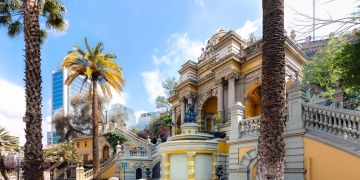
- Santiago, Chile
January in Santiago
- Study Program
Spend January studying abroad during Chile's summer!
- Mountains to Hike

Open Campus Block
- Multi-Location Offering
- Part-Time Internship
Our Open Campus Block program allows you to start studying in Santiago, then study in two other countries in one term.
- Volunteering
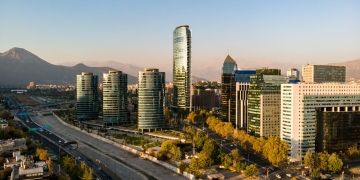
Summer in Santiago
Spend your summer in Santiago and explore the heritage of this Latin American nation while studying contemporary culture at our Global Institute.
© 2024 CIEE. All Rights Reserved.
- Privacy Notice
- Terms & Conditions

- Global (EN)
- Albania (en)
- Algeria (fr)
- Argentina (es)
- Armenia (en)
- Australia (en)
- Austria (de)
- Austria (en)
- Azerbaijan (en)
- Bahamas (en)
- Bahrain (en)
- Bangladesh (en)
- Barbados (en)
- Belgium (en)
- Belgium (nl)
- Bermuda (en)
- Bosnia and Herzegovina (en)
- Brasil (pt)
- Brazil (en)
- British Virgin Islands (en)
- Bulgaria (en)
- Cambodia (en)
- Cameroon (fr)
- Canada (en)
- Canada (fr)
- Cayman Islands (en)
- Channel Islands (en)
- Colombia (es)
- Costa Rica (es)
- Croatia (en)
- Cyprus (en)
- Czech Republic (cs)
- Czech Republic (en)
- DR Congo (fr)
- Denmark (da)
- Denmark (en)
- Ecuador (es)
- Estonia (en)
- Estonia (et)
- Finland (fi)
- France (fr)
- Georgia (en)
- Germany (de)
- Germany (en)
- Gibraltar (en)
- Greece (el)
- Greece (en)
- Hong Kong SAR (en)
- Hungary (en)
- Hungary (hu)
- Iceland (is)
- Indonesia (en)
- Ireland (en)
- Isle of Man (en)
- Israel (en)
- Ivory Coast (fr)
- Jamaica (en)
- Jordan (en)
- Kazakhstan (en)
- Kazakhstan (kk)
- Kazakhstan (ru)
- Kuwait (en)
- Latvia (en)
- Latvia (lv)
- Lebanon (en)
- Lithuania (en)
- Lithuania (lt)
- Luxembourg (en)
- Macau SAR (en)
- Malaysia (en)
- Mauritius (en)
- Mexico (es)
- Moldova (en)
- Monaco (en)
- Monaco (fr)
- Mongolia (en)
- Montenegro (en)
- Mozambique (en)
- Myanmar (en)
- Namibia (en)
- Netherlands (en)
- Netherlands (nl)
- New Zealand (en)
- Nigeria (en)
- North Macedonia (en)
- Norway (nb)
- Pakistan (en)
- Panama (es)
- Philippines (en)
- Poland (en)
- Poland (pl)
- Portugal (en)
- Portugal (pt)
- Romania (en)
- Romania (ro)
- Saudi Arabia (en)
- Serbia (en)
- Singapore (en)
- Slovakia (en)
- Slovakia (sk)
- Slovenia (en)
- South Africa (en)
- Sri Lanka (en)
- Sweden (sv)
- Switzerland (de)
- Switzerland (en)
- Switzerland (fr)
- Taiwan (en)
- Taiwan (zh)
- Thailand (en)
- Trinidad and Tobago (en)
- Tunisia (en)
- Tunisia (fr)
- Turkey (en)
- Turkey (tr)
- Ukraine (en)
- Ukraine (ru)
- Ukraine (uk)
- United Arab Emirates (en)
- United Kingdom (en)
- United States (en)
- Uruguay (es)
- Uzbekistan (en)
- Uzbekistan (ru)
- Venezuela (es)
- Vietnam (en)
- Vietnam (vi)
- Zambia (en)
- Zimbabwe (en)
- Financial Reporting View
- Women's Leadership
- Corporate Finance
- Board Leadership
- Executive Education
Fresh thinking and actionable insights that address critical issues your organization faces.
- Insights by Industry
- Insights by Topic
KPMG's multi-disciplinary approach and deep, practical industry knowledge help clients meet challenges and respond to opportunities.
- Advisory Services
- Audit Services
- Tax Services
Services to meet your business goals
Technology Alliances
KPMG has market-leading alliances with many of the world's leading software and services vendors.
Helping clients meet their business challenges begins with an in-depth understanding of the industries in which they work. That’s why KPMG LLP established its industry-driven structure. In fact, KPMG LLP was the first of the Big Four firms to organize itself along the same industry lines as clients.
- Our Industries
How We Work
We bring together passionate problem-solvers, innovative technologies, and full-service capabilities to create opportunity with every insight.
- What sets us apart
Careers & Culture
What is culture? Culture is how we do things around here. It is the combination of a predominant mindset, actions (both big and small) that we all commit to every day, and the underlying processes, programs and systems supporting how work gets done.
Relevant Results
Sorry, there are no results matching your search., a housing drought.
Housing, inflation and the Fed
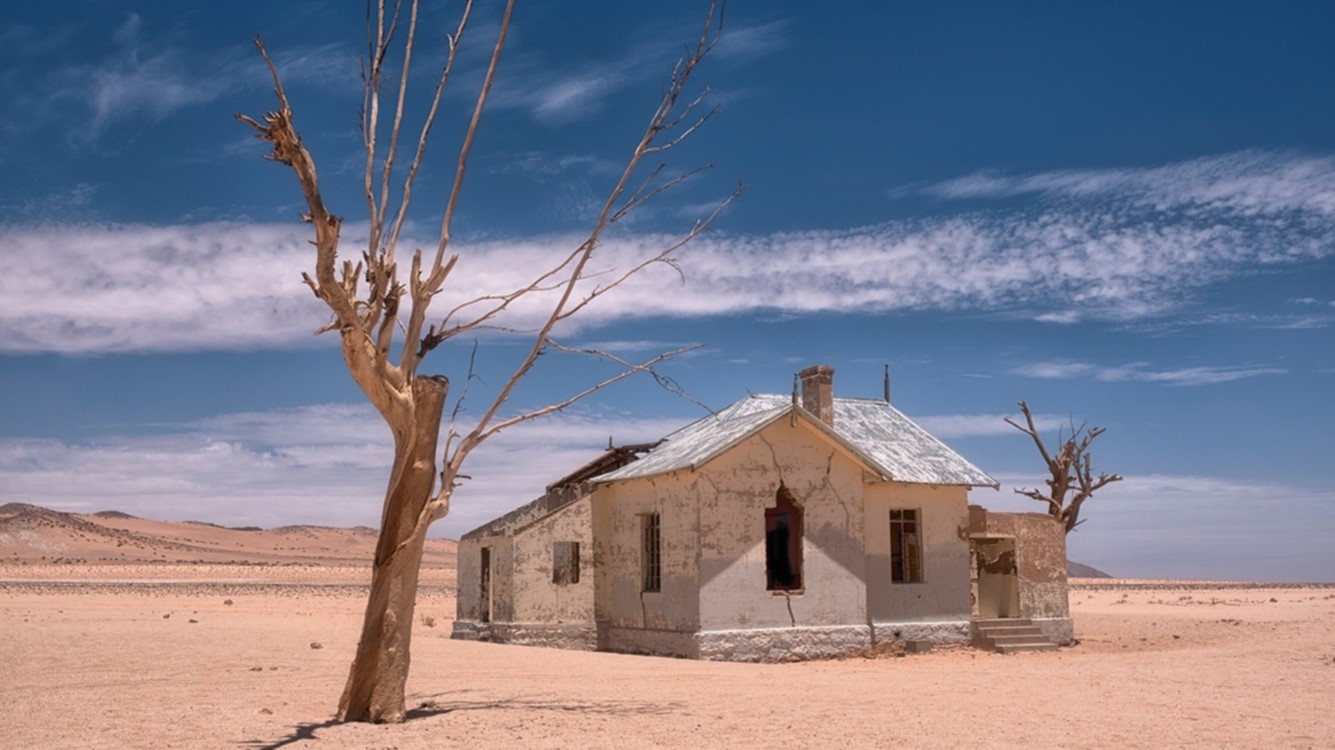
April 8 , 2024
“Water, water every where,
Nor any drop to drink.”
That line from Samuel Taylor Coleridge’s poem “ The Rime of the Ancient Mariner ” has always haunted me. Its imagery of scarcity amidst abundance seems an apt metaphor for ongoing constraints on the housing market, despite the strongest recovery from a recession since the early 1980s.
There is no topic that has evoked more emotion over the last year than my discussions on the dynamics of the housing market. The anger and resentment are palpable, especially when I talk about it on my X-feed (the platform formerly known as Twitter).
I understand. Shelter is a basic need, along with food and water; it is unaffordable for too many. The problem predates the pandemic, but the pivot online and shift to work and schooling from home exacerbated the problem.
Home values have gone up more than 50% since 2019, rents have risen more than 30%. Wages and salaries have risen about 18%.
Many have lost hope of ever owning a home. A recent poll revealed that eight in ten renters still aspire to own a home, but more than 60% believe they will never be able to do so. Millennials are the most disillusioned.
It reminds me of the sense of foreboding my father felt when I was young. The stagflation of the 1970s and double-digit interest rates of the early 1980s left him convinced that I and my generation would never achieve the milestones he had.
One of his greatest accomplishments was the purchase of my childhood home with my mom, the epitome of the “American Dream.” It was a tiny brick house with the same floor plan as all the others that lined our street. I never had to ask where the bathroom was when playing with all my friends on the street. It was built in the wake of WW-II to house soldiers returning home and working in the auto plants in Detroit.
Rates fell and homeownership rebounded. I ended up buying my first home at the same age that my father had. I remember the day our offer was accepted. It was Saint Patrick’s Day.The realtor told me I had the luck of the Irish. In Chicago, everyone is Irish on Saint Patrick’s Day.
Fast forward to today. The mortgage winter, which has frozen existing homeowners in place and buyers out, is primed to thaw. Listings are beginning to pick up. That doesn’t mean the housing shortages will soon dissipate; they are chronic.
Estimates are all over the place, ranging from a low of 1.8 million to a high of 5.5 million, depending on the methodology. Reality is somewhere in between. I prefer estimates based on demographics and the stock of homes in the market. They suggest that the shortfall is closer to three million.
The data are worse for the poorest households. We need some seven million homes to house those who earn the least; that is gut-wrenching and provides context for the ranks of the working homeless.
This edition of Economic Compass takes a close look at the outlook for housing, what it means for the outlook for inflation and how the Federal Reserve will react to those shifts. Recent inflation data has reminded us that the path down on inflation can be “bumpy.” The improvement in home values and rents could stall, while other prices related to housing could rise.
The good news is that we appear to be at a peak in rates. The Fed would rather hold rates higher for longer than risk a recession to cross the finish line on inflation. The bad news is that we now expect two instead of three rate cuts this year.
The economy remains strong
This iteration of the forecast includes an upward revision to the immigration data, which strains state and local resources, but adds to the overall economic growth. The increase in immigration boosts labor force growth, the pace that employment continues to improve and consumer spending in 2024. We have also kept a shock to the VIX before and after the election, given the high probability of a contested election outcome.
Real GDP is expected to rise 2.3% in the first quarter, a sharp slowdown from the 3.4% pace of the fourth quarter. However, much of that “weakness” is due to a large widening of the trade deficit; imports of services (travel abroad) was especially strong. Consumer spending moderates but does not collapse, while the housing market gains momentum. Business investment slows but inventories drained in the fourth quarter are rebuilt. Government spending slows in response to a drop in federal spending, which was curbed due to the continuing resolution.
Real GDP is forecast to rise 2.1% in the second quarter. Gains in consumer spending are expected to drive overall growth along with the housing market. Business investment continues to slow, inventories are little changed and the trade deficit further widens. Government spending remains subdued, with a rebound in federal spending triggered by the budget deal offset by a slowdown in state and local spending.
Fed holds. The Fed is now expected to hold off on rate cuts until September and cut only twice instead of three times in 2024
The housing outlook
Table 1 summarizes the outlook for housing given the forecast for a soft landing or better:
- New and existing home sales are forecast to rise 5.4% to 5.03 million units in 2024. New home sales are expected to pick up more than existing home sales.
- Housing starts are forecast to rise 2.7% to 1.46 million units in 2024. A double-digit jump in singlefamily starts is expected to offset a sharp drop in multifamily construction.
- Home values are forecast to rise between 2% and 5%, depending on the measure. That is a slight moderation from last year.
Table 1: Housing Outlook
Underlying fundamentals
Millennials are a force to reckon with.
The outlook for the housing market rests on a complex mix of the ability and willingness to buy:
- The economy is expected to continue to grow in 2024, but at a slower fourth-quarter-to-fourth-quarter pace than in 2023; unemployment is expected to remain near record lows.
- Wage gains are expected to cool but not collapse, which is helping to improve affordability along with a slowdown in the pace of housing appreciation.
- The number of new homes completed topped 1.7 million in February, the largest number since the start of 2007. That is not enough to meet all demand, especially for those with the lowest incomes, but it is a step in the right direction.
- Builders have proven themselves nimbler, moving downscale on size and offering incentives, including mortgage rate discounts to attract first-time buyers.
- Listings are starting to pick up.
- Millennials are forming households, having children and moving into their peak home buying age – more than 12,000 are turning 35 a day, the largest cohort to do so on record.
- The desire to buy remains elevated, despite low affordability; the largest hurdle to acting among highincome prospective buyers is a drop in rates.
- Every time rates drop below the 7% threshold, applications to purchase a home pick up; we are close to that level now.
- Aging in place continues, but more arbitrage opportunities exist for buyers willing to trade their suburban homes for smaller condos and co-ops.
It would not take much of a drop in rates to unleash pent-up demand, especially among the largest generation of young adults we have ever seen.
Subdued gains
Existing and new sales rise.
Existing home sales are expected to rise to 4.3 million in 2024, up 4.9% from 2023. The gains are expected to come in fits and starts, given the uncertainty about the timing of rate cuts but the trend is in the right direction. Supply is the primary constraint to stronger growth but other factors are now weighing on decisions.
Climate change is beginning to affect decision making. Areas most exposed to climate disasters are selling at a discount relative to properties with lower risks. Low-income households were left no choice but to live in the highest risk and least desirable areas.
The damage associated with extreme climate events is accelerating. (See Chart 1.) Insurance companies have begun to raise premiums or pull out entirely from areas with the highest risks. Lenders are likely to follow suit and tighten standards for homes in the most exposed areas. Those shifts hit low-income households harder.
Wealthy households who want the amenities of a beach view are more likely to take or discount that risk. They can either afford the exorbitant insurance associated with building near rising water levels or discount the risk of a disaster affecting them. Consumers who have done better financially, and suffered fewer setbacks in their lives, tend to believe they will continue to do so and vice versa.
The pivot to work-from-home and surge in weddings and births post-pandemic has prompted buyers to move much further from their work than they were prepandemic. Average commutes have increased by 10 miles to 27 miles; millennials have moved the furthest away from their work. That suggests that: 1) there is no putting the work-from-home genie in the bottle and 2) demand for homes in suburban and even exurban areas is expected to remain robust.
Urban centers still offer students, empty nesters and many families opportunities. Cities offer a broad spectrum of services that small communities might not have, from healthcare to entertainment and mass transit. Their demise has been greatly exaggerated.
There is an arbitrage opportunity for empty nesters to trade in their suburban home for a premium and get a deal on condos and co-ops in some urban centers. I talked to two who have done so in the last week alone in Chicago.
Many of the hottest pandemic markets have seen a drop in prices, but migration to those markets remains strong. Austin is a good example.
First-time buyers are relying more on their parents to help them with down payments than in the past. Many have parents who have either locked into ultralow rates or paid off their mortgages, which has made it easier for them to help their children with down payments.
The downside to the shifts associated with climate change and the inter-generational wealth transfers is that they tend to exacerbate inequalities. Older, white parents own an outsized share of homes and are better positioned to help their children than other groups.
Single women are the fastest rising demographic of home buyers. They have out-attained men in education through graduate school, and narrowed but not fully closed the gap in what they earn relative to men.
New home sales are expected to rise faster than existing sales, reflecting a move downstream by builders. Builders have become extremely nimble and able to adjust to market conditions as they change. They rolled back incentives in recent months as demand picked up from falling mortgage rates.
New home prices dropped in recent years, as builders built smaller homes. However, there is a limit to how much more they can continue to reduce prices. Zoning laws and land values are buoying property costs, while supply chains remain fragile and complaints of worker shortages are still common.
Regional differences . Pending home sales, which tend to lead overall sales by a month or two, rebounded slightly in March after losing ground earlier in the year. The South and Midwest saw gains, while higher cost regions in the Northeast and West continued to struggle. A drop in mortgage rates will more evenly spur demand across regions, although migration from high- to low-cost areas continues.
The new low-cost areas are now in the Midwest, which didn’t experience the surge in migration or prices that occurred in pandemic hot spots. Pockets in the South remain destinations, including Texas and Florida. Arizona has cooled substantially over the last year, which is reflected in a rise in listings.
Chart 1: Disasters getting more frequent
Number of (inflation-adjusted) billion dollar disasters
Housing starts diverge
A jump in single-family starts, which are counted when ground is broken on a new project, is expected to offset a sharp drop in multifamily construction. Publicly traded home builders have deep pockets and have been able to clear a profit as they moved downscale and offered mortgage buydowns to tap millennial demand.
Multifamily construction ballooned in recent years but started to slide in 2023. The softening of rents, higher rates and tighter lending standards took a toll on valuations. The largest overbuilding occurred in the markets where people were migrating.
However, most in the industry believe that valuations on multifamily properties are nearing a bottom. Apartment demand remains strong in many of the most overbuilt markets.
That suggests that the relief we see in rents could be temporary. Space could be scarce again as we get into 2025 and 2026. Overall rent indices have already begun to move up after slowing dramatically in 2023.
Why can’t we just convert more office space into affordable housing? The tradeoff is hard to make economically feasible, given the costs. Office spaces lack the basic amenities needed for housing, including things like plumbing for kitchens and baths. Many have hefty tax consequences along with all the other zoning and regulations required to convert to residential.
Regional differences . The South has long been the dominant player in construction markets, as they have the easiest permitting process and an abundance of land. (The South includes Texas in the official statistics.) The move from colder climates to warmer winter climates, notably by retirees, has combined with the migration of younger professionals to the region.
The West and Midwest are expected to gain some ground in the year to come. The largest constraints on land are in the Northeast, which has limited its recovery. Permits in the Northeast have not moved much in recent years and are expected to remain subdued.
Moderating price pressures
Home prices are forecast to continue rising, but at a slower pace in 2024. First-time buyers are expected to put a cap on how much higher homes appreciate. Much depends on the extent to which listings rise.
Another hurdle is the stock of housing, which has aged and fallen into disrepair. The median age of existing homes is 40 years old, nearly a decade older than the median age of homes going into the housing bust.
Fewer owners repaired and upgraded their homes after home values plummeted. Homeowners who age in place are often constrained by low fixed incomes. Both trends have left us with fewer move-in ready homes.
Other costs that could put a damper on the price that buyers are willing to pay include real estate taxes and insurance. Retirees can get taxes capped but younger homeowners cannot. Homeowners’ insurance has skyrocketed or disappeared entirely. Even those who paid off their mortgages or locked into ultralow rates are struggling with escalating expenses.
Lenders are starting to take note and, much like insurers, are likely to pull out of some of the riskiest areas. That will further limit access to affordable housing. Some of the cheapest homes have the highest exposure to climate change.
The number of overvalued markets according to Moody’s has dipped over the last year, as prices in some of the hottest pandemic markets moderated. However, affordability remains low across much of the nation.
Over the next year, prices are expected to rise in the Midwest and parts of the Northeast, such as New York and Pennsylvania. Georgia, Alabama and Louisiana are expected to also see increases. The soft spots are expected to be Arizona, Colorado, Idaho and Utah – those areas saw outsized gains earlier in the recovery
Implications for inflation
Changes in shelter costs tend to show up with a lag, as it takes time for homes and leases to turn over. That is one reason that many expected overall inflation to further moderate in 2024. It is unclear if the slowdown we are seeing in rents and prices will be enough to accomplish that goal.
Prices in the services sector picked up at the start of the year. Medical costs and insurance premiums are only beginning to reflect the surge in demand and constraints due to staffing shortages.
A pickup in housing should spur spending on goods which could derail the drop in goods prices. Meanwhile supply chain fragility persists. The slowdown in traffic in the Panama and Suez Canals are two examples. The collapse of the Francis Scott Key Bridge, which carried 4,900 trucks per day, is another example - $28 billion in goods will need to be rerouted.
Chart 2 shows three scenarios for core PCE inflation, the Fed’s favored measure. Comparisons in the back half of the year get harder when measured on a year-over-year basis, due to the sharp deceleration we saw in price levels in the second half of 2023. The trajectory underscores the challenges that the Fed faces. The base case suggests that inflation will cool but less so than a month ago.
Risks. The forecast only has modest increases in energy prices. A surge in oil prices can’t be ruled out, given escalating tensions in Ukraine and the Middle East.
Chart 2: Shelter inflation a risk for back-half 2024
Core PCE, fourth quarter over fourth quarter
A slower glide path for the Fed
Participants in the March Federal Open Market Committee (FOMC) meeting were closer than many realized to two instead of three cuts for the year; 9 of 19 participants forecast two cuts or less. We now expect only two rate cuts in 2024.
The next forecast is due in June but the players around the table will shift. President Loretta Mester of the Cleveland Fed, who favored waiting on cuts, is retiring. President Alberto Musalem of the St. Louis Fed starts in April and will attend his first official meeting in May. He is not a voting member of the FOMC this year.
Rate cuts for 2025 were also scaled back. The Fed is using a slower glide path to enable supply more time to catch up with demand. That is an especially heavy lift in the housing market, given how large the gab between supply and demand remains.
Risks . The Fed is the world’s most influential central bank. Emerging markets are particularly sensitive to the Fed’s decisions. The slower glide path may cause them to delay their own cuts. If emerging market central banks cut too fast, then their currencies may rapidly depreciate. That could raise their import prices and debt servicing costs. The more the Fed delays rate cuts, the more downward pressure that puts their currencies, inflation and the costs of servicing the debt. That could delay rate cuts and up the risk of a larger financial crisis.
Bottom Line
The economy has made great strides since the depths of the COVID-recession, but gains remain uneven. Scarcities in the housing market persist, despite some catch-up in construction in recent years. My childhood home was not much by today’s standards. It didn’t need to be; it represented the first rung on the ladder to building wealth for a young family that had little.
That is all millennials and those behind them want, a chance at achieving that same dream. The goal is to allow some catch-up for those still feeling left behind. Even a small drop in rates represents a step in that direction.
Dive into our thinking:
KPMG Economics
A supply drought Housing, inflation & the Fed
Explore more

A source for unbiased economic intelligence to help improve strategic decision-making.

Global Navigator from KPMG Economics
Global growth is expected to stabilize in 2024, remaining close to the pace we hit pre-pandemic during the year.

We’re not in Kansas anymore...The view from Washington
Debate over whether the first rate cut will occur in June will be heated.
Subscribe to insights from KPMG Economics
KPMG Economics distributes a wide selection of insight and analysis to help businesses make informed decisions.
Meet our team

By submitting, you agree that KPMG LLP may process any personal information you provide pursuant to KPMG LLP's Privacy Statement .
Thank you for contacting KPMG. We will respond to you as soon as possible.
Contact KPMG
Job seekers
Visit our careers section or search our jobs database.
Use the RFP submission form to detail the services KPMG can help assist you with.
Office locations
International hotline
You can confidentially report concerns to the KPMG International hotline
Press contacts
Do you need to speak with our Press Office? Here's how to get in touch.

COMMENTS
2) Housing: Be sure to organize your housing prior to arriving in Chile - but don't fret, as most study abroad companies will actually organize this component of your study abroad experience for an added cost. The place you decide to make your "home away from home" will greatly influence your study abroad experience in Chile.
Get a Flight Credit worth up to $350 when you apply with code* by May 6, 2024. Bursting with color and old-world charm thanks to its brightly painted buildings, Valparaiso is the second largest metropolitan area in the country. Declared a UNESCO World Heritage Site and known as the cultural capital of Chile, the city is spontaneous, cheerful ...
Study abroad in Chile for a semester, summer, or year. Our Chile study abroad programs offer studies in health, politics, social justice, Spanish, and more. ... and spend time with your host family all in an average day while studying abroad in Chile. Mix that with personal travel—imagine visiting Torres del Paine National Park or Peru!—and ...
Rental agreements in Chile are either for an indefinite or a definite period. The more flexible leases allow tenants to leave after giving one month's notice. Leases with a definite period are generally for 12 months. Overall, expats may be able to negotiate shorter or longer rents with a flexible landlord.
With everything from short-term language immersion programs to full semester and year-long programs available, Chile makes it easy to find a time to study abroad that works well with your academic goals and travel dreams. 3. Inquire at your university and look for programs.
Housing. All CASA-Chile students will live with a host family. To facilitate the homestay-matching process, students complete a homestay questionnaire in Spanish, with information regarding hobbies, interests, level of fluency in Spanish, religion, experience with international travel, dietary restrictions, appropriate medical information (i.e. allergies, physical disabilities, etc) and a ...
Spend January studying abroad during Chile's summer! Designed for students who want to travel with students from all over the U.S. to Chile's capital, this three-week program invites you to earn academic credits while living in one of Latin America's most modern cities. ... Housing = $860 *** Insurance = $80. Total Fees = $3,950. Estimated Costs.
The apartments are conveniently located in downtown Santiago and are only a 10-minute commute by metro to get to campus. In apartments, students will live with other USAC students. To choose a privately owned residence hall or rental apartment, you will be responsible to locate and make your own rental agreements. Lobby of student housing.
HOUSING. Choosing a safe and enjoyable place to live while abroad is a very important part of a student's international experience. For this reason, the International Office provides students with a Housing Guide that lists the different accommodations in Santiago used by former exchange students. Please note: It is the exchange student´s ...
SU. SE. YR. Starting at $14,395. VIEW ALL Chile PROGRAMS. Bookworms and aspiring writers will appreciate Chile's literary legacy. The country gave birth to some of Latin America's greatest writers: Nobel Prize poets Pablo Neruda and Gabriela Mistral, and the novelists Roberto Bolaño and Isabel Allende, among many others.
Please use the quick inquiry on the right to contact us! Your contact personMalte [email protected] +56 2 2264 1719 +56 9 7764 4148 ContactChile Intercultural Management Rafael Cañas 174, Providencia Santiago de Chile Mon - Fri 9 am to 5.00 pm.
Travel Abroad Chile Housing; Contacto. Para más información consulta a: Sergio García [email protected] Teléfono 322273567. Also available in : English, Português FAMILIAS ANFITRIONAS. Te invitamos a revisar nuestras secciones de información: Alojamiento con Familias Anfitrionas para Long Term Programs;
The pricing depends on the location, size, and amenities. In Santiago, for example, a one-bedroom apartment in the city center may cost around $500 to $800 per month, while a similar property in the suburbs could be more affordable, around $350 to $600 per month. 2. Shared Spaces.
2. Find a Job in Chile. Nothing is so important to job searching in Chile than "pituto". Roughly translated as "personal network", pituto is like a living form of LinkedIn. At best, pituto demonstrates how friends support each other in a job hunt. At worst, it's a controlling factor in the so-called hidden job market.
Transforming Travel into a Career Path: A Comprehensive Guide. 2024-03-29 09:03. The Ultimate Student Guide to Traveling Smart and Embracing Global Citizenship. 2024-03-20 07:03. ... Find and book the best student housing in Chile. Search and compare rooms by city, region and university. No booking fees!
The sheer range of landscapes on display in Chile is remarkable, as it stretches all the way from the fjords and wind swept Southern Ocean at its tip, to the dry heat and arid splendour of the Atacama in the North. If you've ever dreamed of chasing summer or winter round the globe, Chile offers unmatched chances to savour both.
Make Living Abroad a Reality! We hope that you have a better understanding of how CIEE's housing process works, as well as the 3 options we provide - homestays, apartments, residence halls/dorms. The faster you apply, the faster you'll make your dream a reality! If you're considering a study abroad program, it's likely that you're ...
We strive to match your housing preferences with our available accommodations; however, housing preference requests cannot be guaranteed. Homestay. All Veritas participants will live in homestays with Chilean families. Host families are amazing as you will get a full linguistic and cultural immersion during your time abroad.
CIEE Santiago. Living with a host family has been a really fundamental part of my experience studying abroad. And I can't say it's all been sunshine and roses, but it's definitely been the part of my experience where I've learned the most. It's really hard to adjust to living with a family who has different routines, different foods ...
MARCH 30, 2021. These are the new measures for travelers returning to or entering Chile from abroad. Starting on Wednesday, March 31 at 5am, anyone entering Chile from abroad must complete 10 days mandatory quarantine, with no exemptions. The first 5 days must be carried out at a quarantine hotel especially for travelers where they will undergo ...
The following documents are necessary components of your Chile Retirement Visa application: Valid Passport: Ensure that your passport remains valid for at least six months beyond your intended arrival date in Chile. This ensures your eligibility to travel and reside within the country.
Select Housing Fee = $400 ^ Financial Aid. CIEE offers the most grants and scholarships of any study abroad organization, including $8 million/year in travel grants, merit-based scholarships, institutional and MSI grants, and Gilman Go Global Grants. See Scholarships †
Learn about Teaching English in a Homestay in Chile for 1, 2 or 3 Months with Greenheart Travel. Read verified Greenheart Travel reviews and in-depth alumni interviews to discover if this program is the perfect teach abroad program for you.
Real GDP is expected to rise 2.3% in the first quarter, a sharp slowdown from the 3.4% pace of the fourth quarter. However, much of that "weakness" is due to a large widening of the trade deficit; imports of services (travel abroad) was especially strong. Consumer spending moderates but does not collapse, while the housing market gains ...